

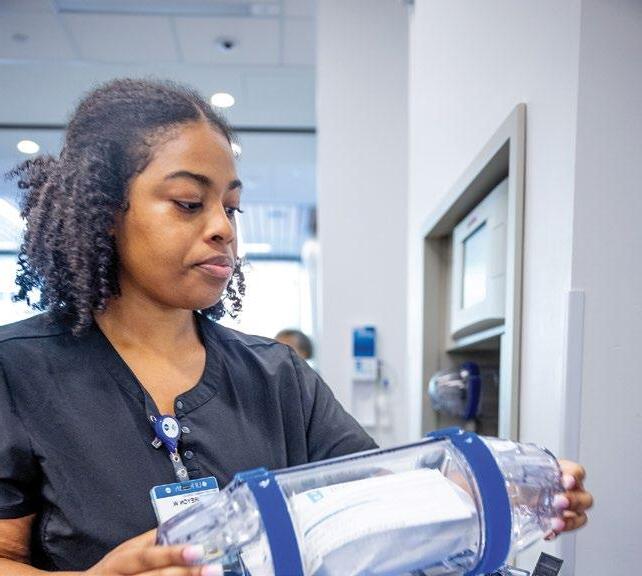
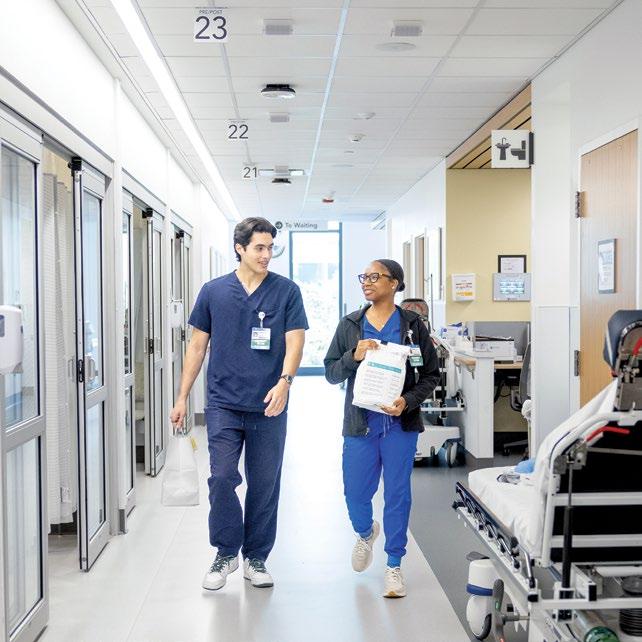
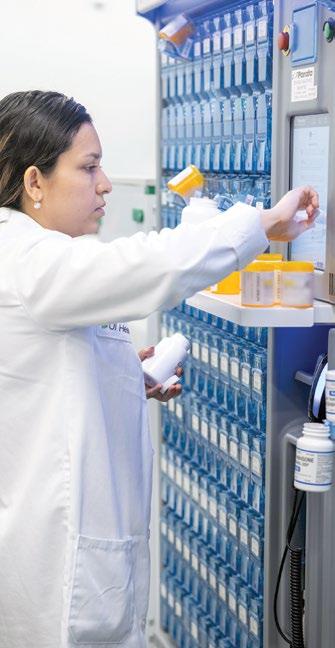
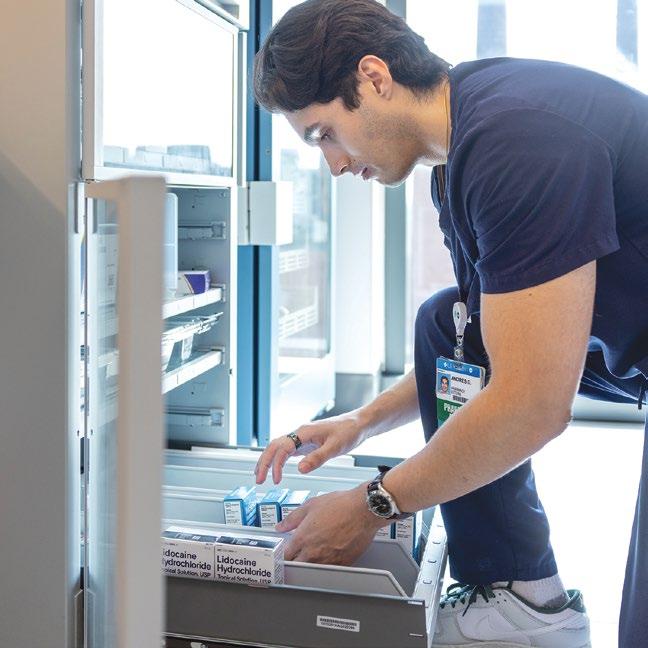
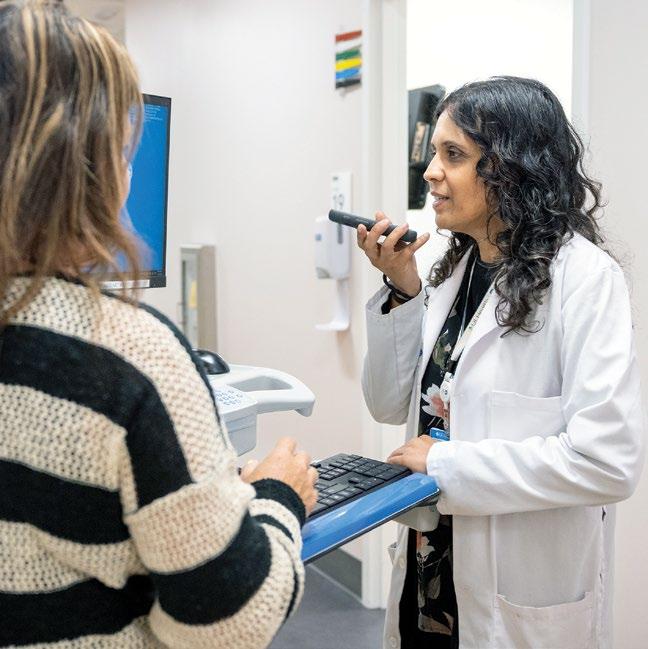
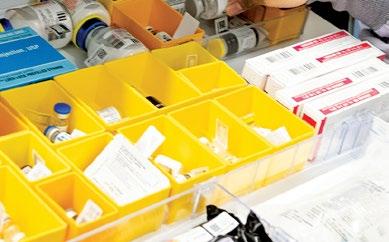
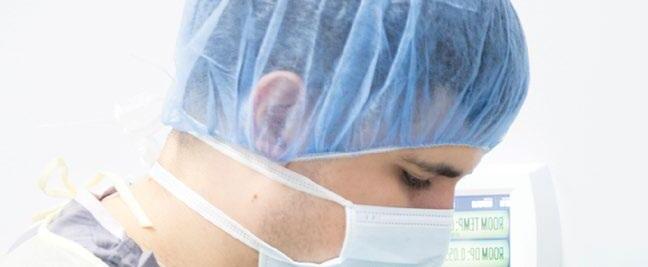
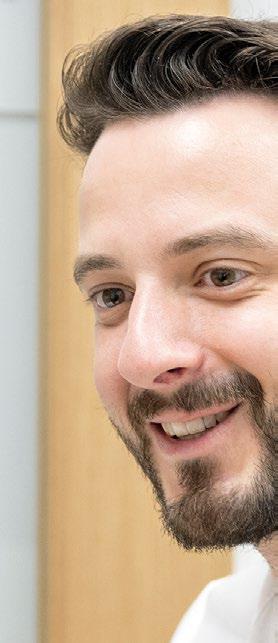

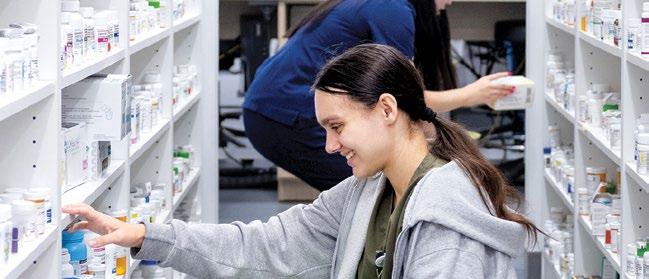
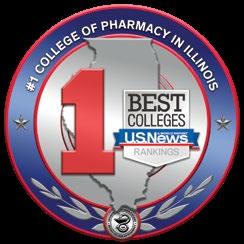
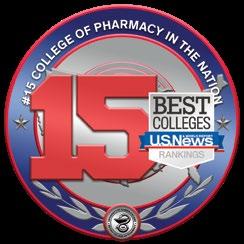
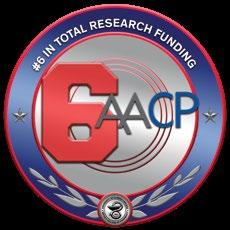

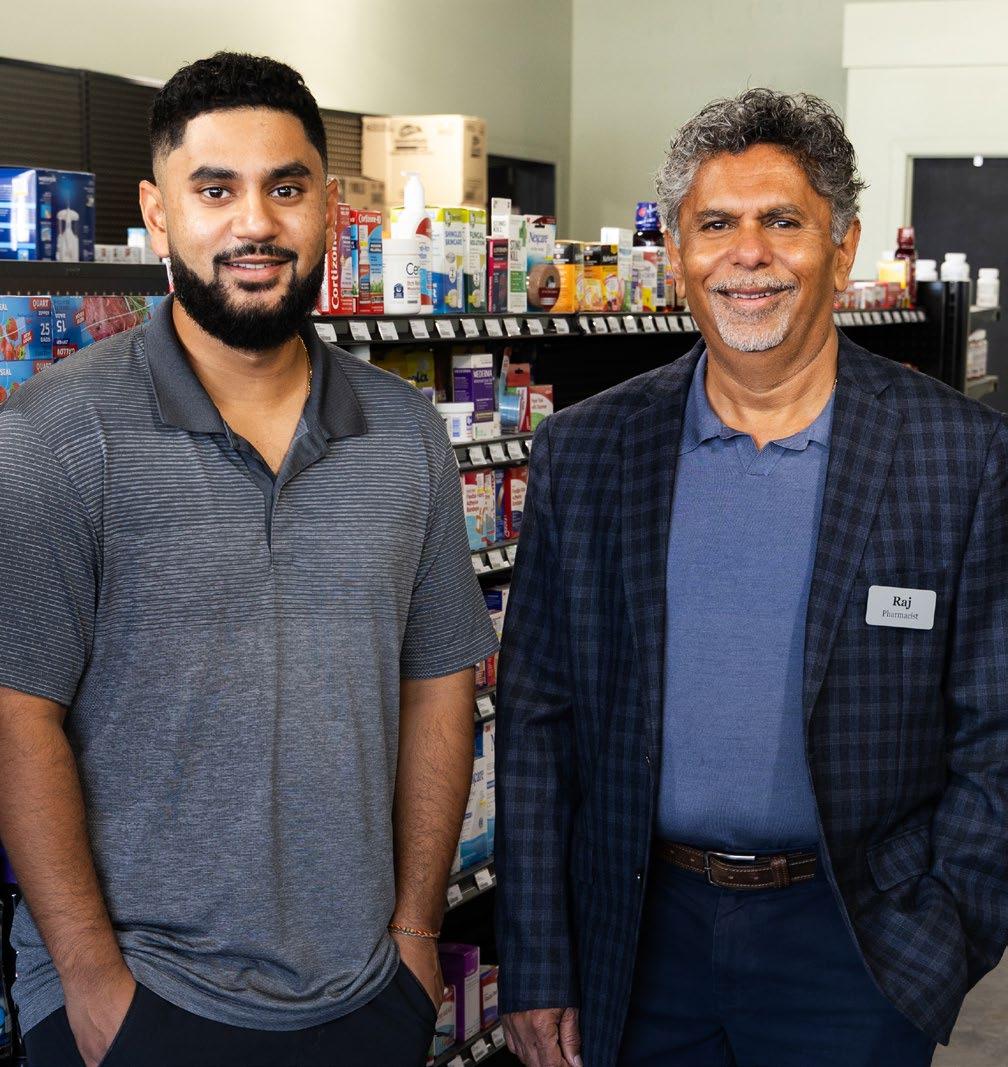
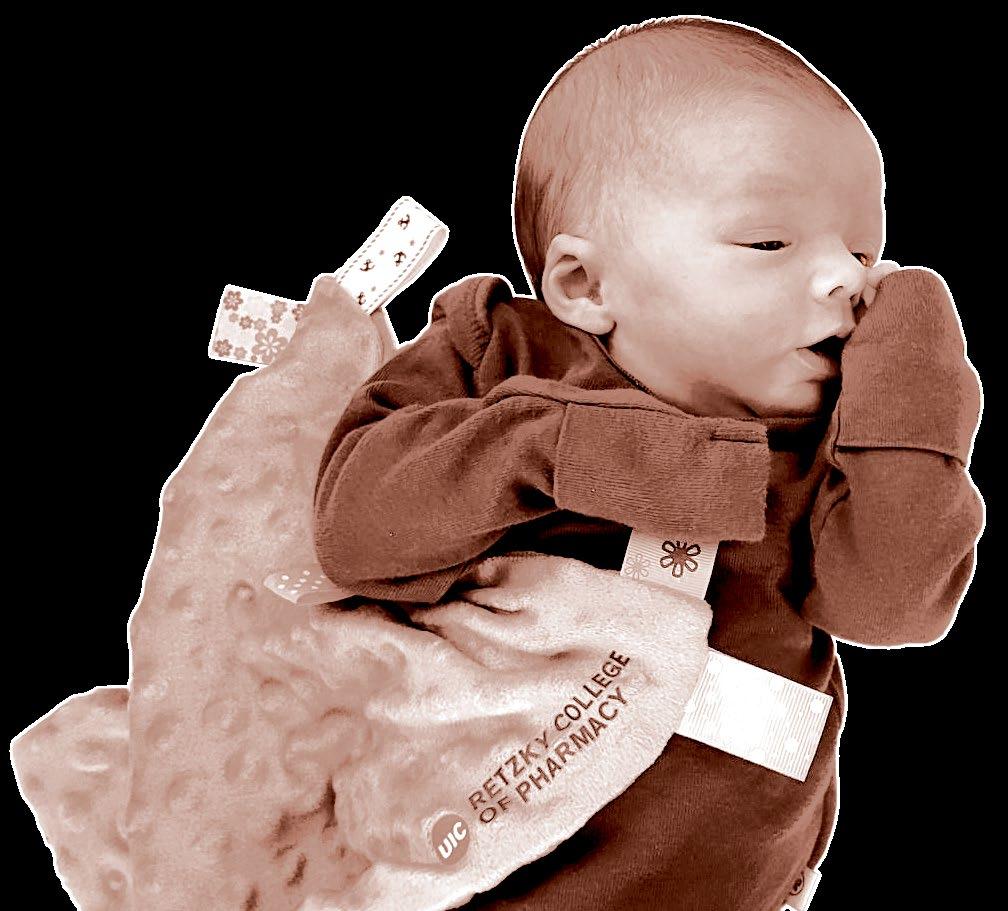
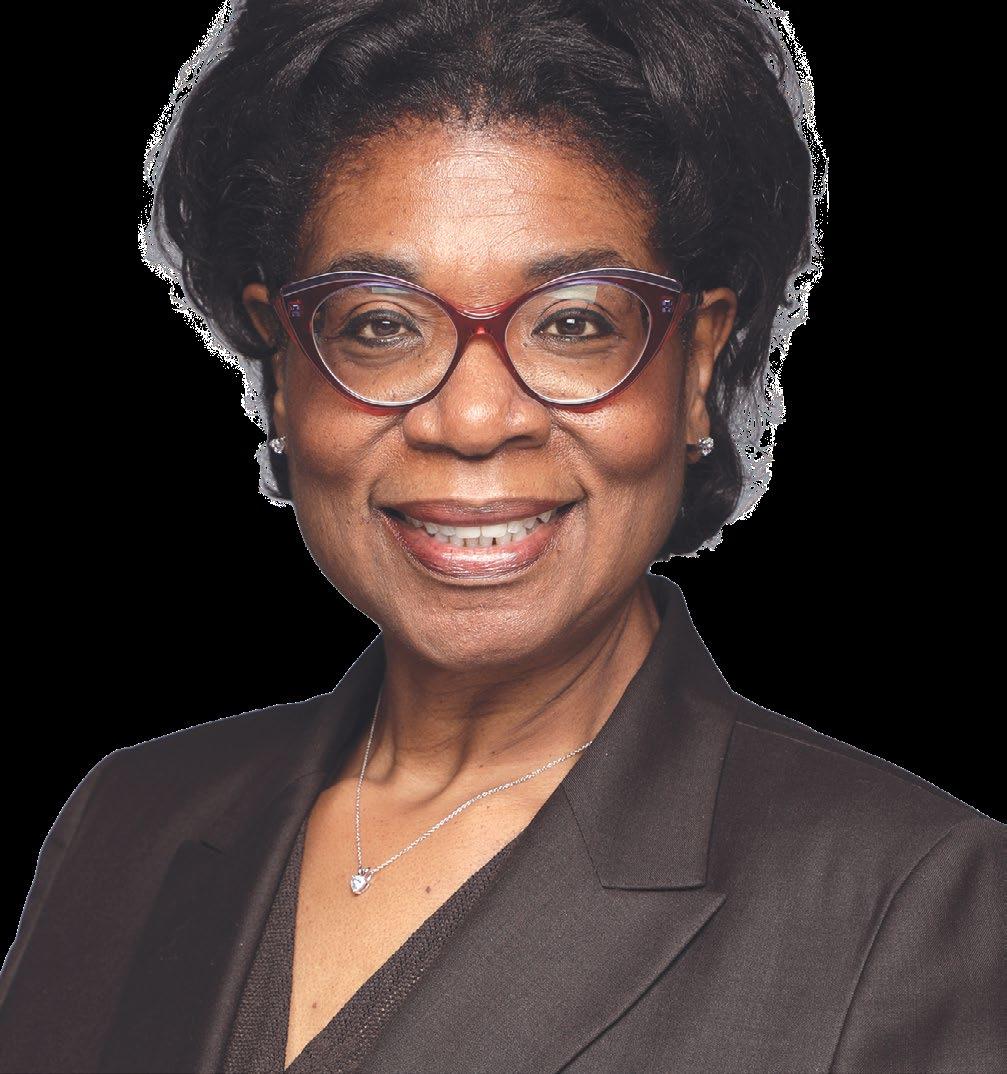




















BY DEAN GLEN SCHUMOCK
This past year has been difficult for higher education— with federal funding cuts to research, health care, and student aid. While the UIC Retzky College of Pharmacy has been impacted by all of these, we are fortunate to also continue to have many successes to celebrate. In the Fall 2025 issue of The Pharmacist, you will read about some of those.
We started the semester celebrating one of the largest recent first-year cohorts to the Doctor of Pharmacy Program—192 students from Illinois, across the country, and around the world— half of whom are first generation college students. This diverse, highly talented group promises to set new records of excellence and achievement on their way to leading the profession. And their journey will be greatly supported by scholarships from you, our alumni. This includes 72 Retzky recruitment scholarships that were awarded for the first time.
We also continue to celebrate our faculty and trainee’s research achievements, several of which are noted in this issue. Their success is why our
research rankings increased to #6 in the country among schools of pharmacy, with $31.6 million in FY24, up 5.3% compared to the previous year. And more good news came with the announcement that all the state funding has been received for our new research building, the Drug Discovery and Cancer Research Pavilion. So, as you can imagine, we have plans for even bigger gains for our research in the future!
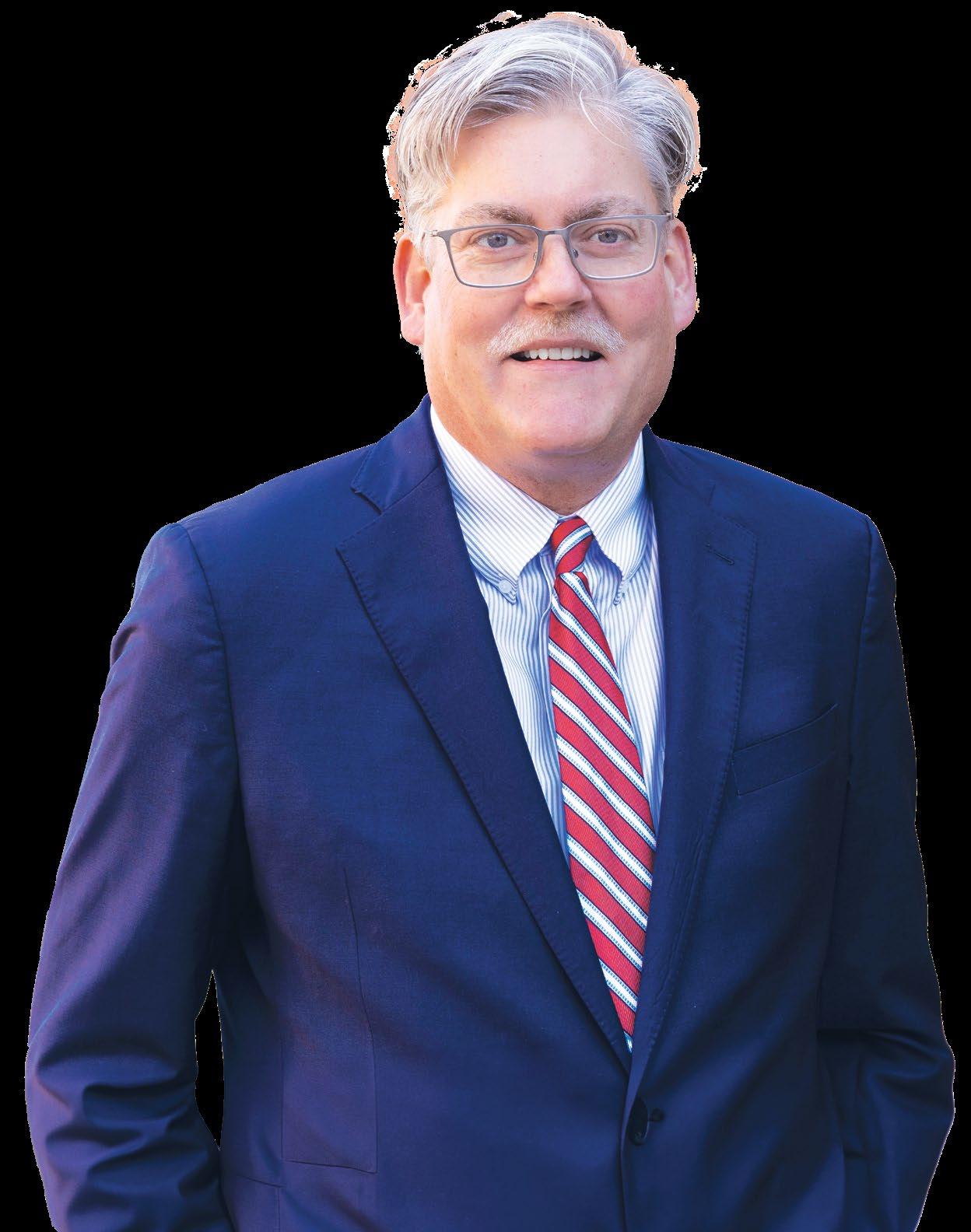
pharmacy.uic.edu
go.uic.edu/PharmFBChicago
go.uic.edu/PharmFBRockford
go.uic.edu/PharmTwitter
go.uic.edu/PharmLinkedIn
go.uic.edu/PharmInstagram
go.uic.edu/PharmYouTube
We also continue to expand our clinical footprint and impact—which exceeds all schools of pharmacy nationally. The lead article in this issue, titled A Prescription for Success, provides an overview of the seven ambulatory pharmacies and clinical services that the UIC Retzky College of Pharmacy runs as an integral part of UI Health. Our ambulatory pharmacy programs not only provide the highest level of quality pharmaceutical care to patients in need, but also serve as training sites for pharmacy students and residents, and as laboratories for important clinical and practice-based research.
We are proud to celebrate in this issue
Change jobs? Get a promotion? Publish a paper? Publish a book? Get married? Have a baby? We want to hear about it all! Submit your updates at go.uic.edu/retzky
the success of one of our key partners: Rajesh Patel, owner of Downtown Discount Drugs in Rockford. His expanded store features a full-service grocery and wellness hub designed to combat food insecurity in Rockford’s Downtown West corridor and was built in partnership with the Illinois New Stores in Food Deserts program. It is a site where UIC Retzky College of Pharmacy students will not only receive great hands-on training but also experience the impact independent pharmacies can have in underserved communities.
Finally, in this issue of The Pharmacist we celebrate the career of one of our own, Dr. Stephanie Crawford. Stephanie retires this December after 33 years serving the college, university and profession. Stephanie is a highly decorated faculty member who educated thousands of pharmacy and graduate students, conducted and published impactful research in health disparities, and contributed to the betterment of society by serving and leading important public and professional organizations. Clearly the most delightful faculty member to ever work here, Dr. Crawford’s largerthan-life presence will be greatly missed.
The successes we celebrate in this, and every issue of The Pharmacist, were made possible by you. Your support of our faculty, students, facilities help us provide the broadest access to the highest levels of excellence in education, research, and service. Thank you for standing with the Retzky College of Pharmacy, UIC, and with higher education.
University of Illinois Chicago Retzky College of Pharmacy Office of Continuing Education and Meeting Services (OCEMS) offers continuing education courses for pharmacists, pharmacy technicians and pharmaceutical representatives. See below for more information.
PHARMACIST CE PROGRAMS
ACPE-approved pharmacist continuing education programs are available. For more information, please visit ce.pharmacy.uic. edu/ce/pharmacist.
PHARMACY TECHNICIAN CE PROGRAMS
ACPE-approved pharmacy technician continuing education programs are available. For more information, please visit ce.pharmacy.uic.edu/ce/pharmtechs
PHARMACEUTICAL REPRESENTATIVE CE PROGRAMS
Pharmaceutical Representative continuing education programs are available for the City of Chicago, the State of Oregon, and the District of Columbia Board of Pharmacy. For more information, please visit ce.pharmacy.uic.edu/ce/ pharmaceutical-representatives
PHARMACEUTICAL REPRESENTATIVE LIVE WEBINAR VIA ZOOM CE PROGRAM
Save the Date! A live webinar via Zoom for Pharmaceutical Representatives will be held on Friday, November 7, 2025 and Friday, April 10, 2026. Pharmaceutical Representative continuing education programs are available for the City of Chicago, the District of Columbia and the State of Oregon and participants may take these as individual homestudy courses or join us virtually to complete all 5 courses in one day. For more information, please visit ce.pharmacy.uic.edu/ ce/pharmaceutical-representatives. If you have questions or suggestions for future programs, please contact us at pharmce@uic.edu
issuu.com/uicpharmacy
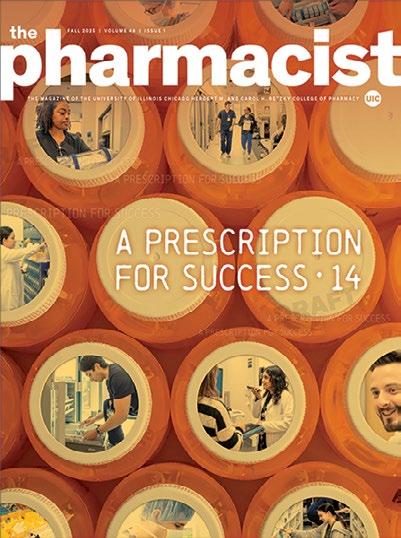
BY SCOTT GOLDBERG
Three UIC researchers, including two UIC Pharmacy faculty, have been awarded a three-year, $1.2 million grant from U.S. Department of Defense Prostate Cancer Research Program. The grant will fund UIC’s research project to leverage data science methods to study variation among patients in the effects of approved treatments for metastatic prostate cancer.
Androgens—a group of steroid hormones that play a role in male sexual development—can fuel tumor growth,

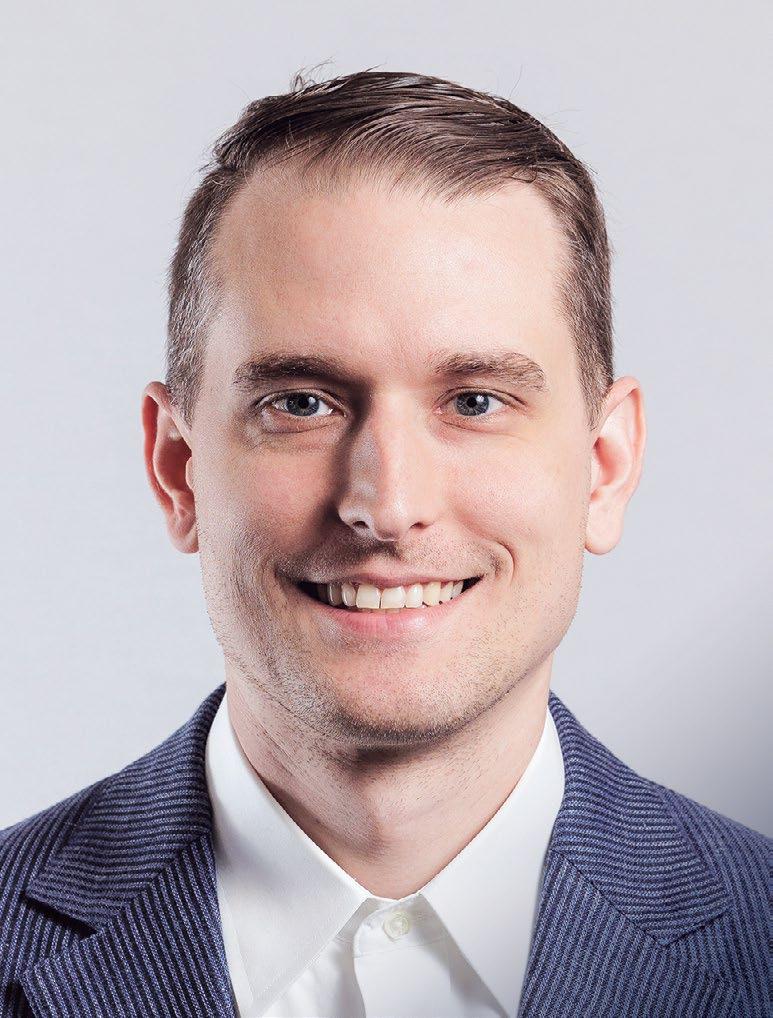
and androgen deprivation therapy has long been a cornerstone of treatment for advanced prostate cancer. In the past decade and a half, two randomized clinical trials tested the effects of adding androgen receptor pathway inhibitors—abiraterone and apalutamide—to androgen deprivation therapy. Those studies, called Latitude and TITAN (Targeted Investigational Treatment Analysis of Novel Anti-androgen), showed that adding those inhibitors prolonged survival of men with metastatic prostate cancer.
But there are still questions about how well these drugs work for different people, especially because the patients in clinical trials can be quite different
from those treated in everyday health care settings. That’s where data science can help, according to the researchers.
“This project will provide critical information for men diagnosed with metastatic prostate cancer who are starting androgen deprivation therapy and considering whether to add abiraterone or apalutamide to their treatment plan,” said Charles Gaber, principal investigator and assistant professor in Pharmacy Systems, Outcomes and Policy at the Retzky College of Pharmacy. “Patients and care providers may see the overall results from the Latitude and TITAN trials and wonder how those results translate to their unique clinical picture.”
The study will reanalyze the clinical data from those two trials using cutting-edge machine-learning methods to uncover the factors that drive variability in the effectiveness of treatment. The researchers aim to use the results to develop a web-based data tool that allows users to supply factors such as age and tumor characteristics to get personalized estimates of treatment effectiveness from the trials. Then they will incorporate data from a broader population, using real-world electronic health record data, to examine the effectiveness of these regimens in routine care populations.
“The ultimate goal of our multidisciplinary project is to develop a clinical-decision support tool that will help providers select and personalize their patients’ prostate cancer therapies to both optimize safety and maximize efficacy,” said UIC’s Dr. Natalie Reizine, a physician at UI Health and assistant professor in the College of Medicine. “We aim to enable clinicians to tailor their treatments and incorporate clinical trial data to benefit the individual patient they are caring for.”
Researchers at Northwestern University and the Moffitt Cancer Center in Tampa, Florida, are partnering with Gaber, Reizine and Todd Lee, professor and department head at the Retzky College of Pharmacy, on the research.
total research dollars awarded for FY24 5.3%
UIC Retzky College of Pharmacy rose to #6 out of 113 pharmacy colleges in the USA in the most recent American Association of Colleges of Pharmacy (AACP) rankings for total research funding.
Over the past federal fiscal year (October 1, 2023 - September 30, 2024), the college received over $31 million, a 5% increase from last year. $20.6 million came from NIH grants. The $31 million was distributed to 57 funded investigators in the college.
increase from FY23 $ 30,024,761
FY23 total
$ 20,684,629 NIH TOTAL
$ 5,615,351 OTHER FEDERAL TOTAL
“The increased research funding is because of the hard work and dedication of our faculty and researchers,” says Dean Glen Schumock. “More important is the new and significant drug discoveries they make that impact people's lives. This is why funding of research and science is so critical.” $ 31,601,693
$ 5,301,703 NON-FEDERAL TOTAL
BY JENNA KURTZWEIL
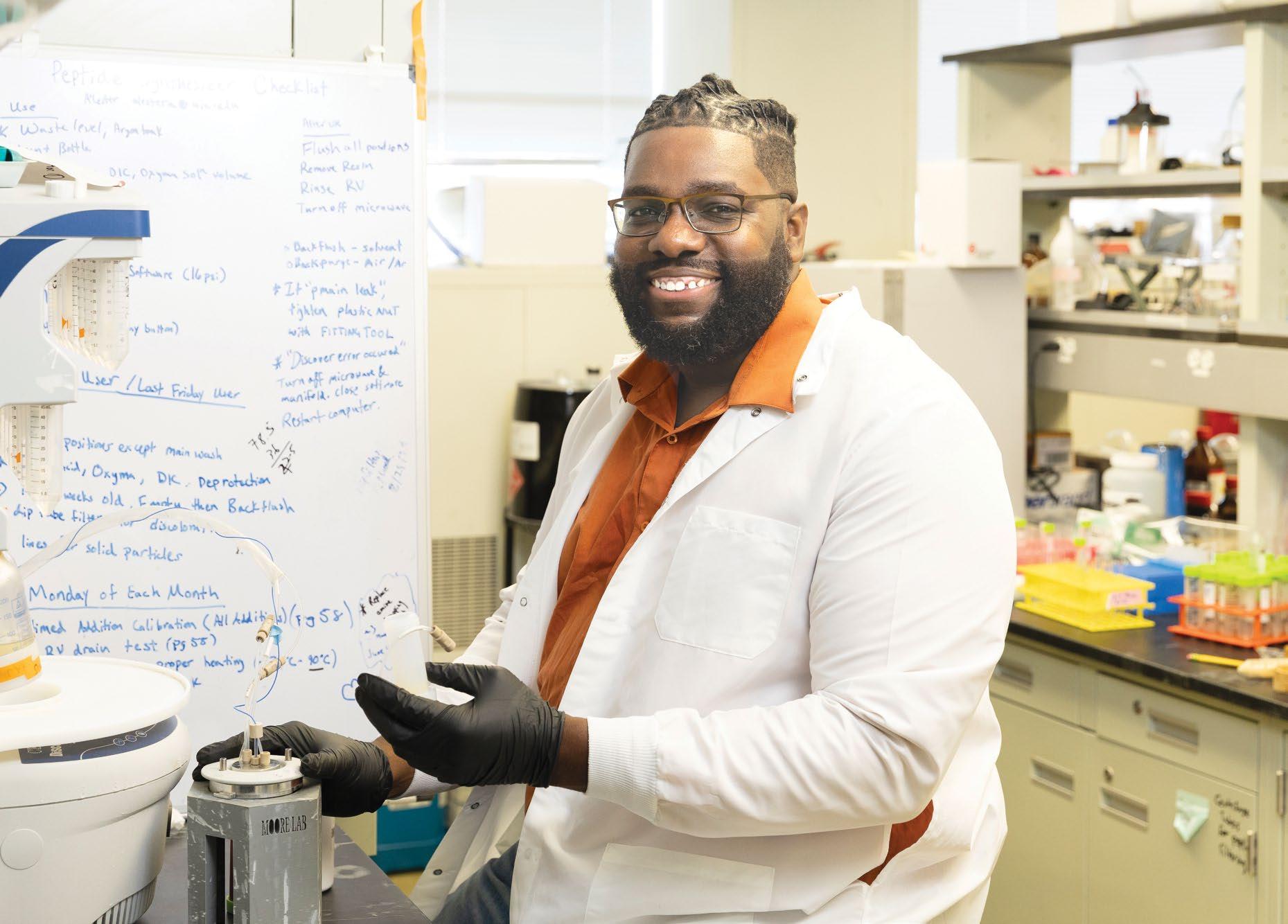
Why is the water green?
Peering through his grandmother’s living room window, 9-year-old A’Lester Allen noticed the backyard pond was uncharacteristically verdant. Thus arose his favorite three-letter question.
“My dad called me ‘professor’ as a kid,” he said of his childhood in rural Alabama, where he could explore pine forests and spot a variety of animals. “But what else could I do but go outside, look at the bees and flowers and ask questions about all of it?”
Allen is now a fourth-year postdoctoral researcher at the University of Illinois Chicago Retzky College of Pharmacy, and his queries have evolved. This year, Allen became the first UIC postdoc to receive the Burroughs Wellcome Fund Career Award at the Scientific Interface,
which he’ll use to continue his work on how the biomolecules in our bodies may help fight cancer.
After cracking the pondwater case with a teacher’s help, Allen was hooked on science. In high school, he interned in a University of Alabama chemistry laboratory funded by the National Science Foundation’s Materials Research Science and Engineering program. Allen earned his bachelor’s degree in chemistry from Stanford University, his master’s degree in materials engineering from San José State University and his PhD in chemistry from the University of California, Santa Cruz.
Allen entered UIC in spring 2022 as an Institutional Research and Academic Career Development Awards postdoctoral researcher. Funded by the National Institutes of Health to “develop a diverse group of highly trained scientists to address the nation’s biomedical research needs,” the program ran at UIC from 2020 to 2025.
Allen’s focus shifted to medicinal chemistry: turning natural processes and materials into medicines and therapies.
“Medicinal chemistry bridges the gap between fundamental science and societal needs, where I can impact my community positively,” he said.
Specifically, Allen hopes to develop new medicines from proteins, the molecules in our bodies that carry out most tasks needed to sustain life. He compares proteins to a freight train pulling more than 100 amino acid cars.
“In some forms of breast cancer, even a single mutation, or broken-down train car, can cause treatments to fail and the cancer to return,” Allen said.
Allen is designing mini proteins called peptides that can work around mutations and stop cancer from returning. He’s working with UIC pharmaceutical sciences professor Terry Moore.
WELCOME
In fall 2024, Allen applied for the Burroughs Wellcome Fund Career Awards at the Scientific Interface. The Burroughs Wellcome Fund supports biomedical researchers to “improve human health through education and powering discovery in frontiers of greatest need.” This prestigious award gives early-career scientists $560,000 over five years to kickstart their research programs and transition into faculty roles.
“These brilliant researchers are tackling some of the most complex questions in science by combining disciplines in bold, innovative ways,” said Tammy Collins, program officer for the Career Awards at the Scientific Interface, in an article announcing this year’s 10 recipients.
Allen’s project is an extension of his peptide research. Despite peptides being 10 to 100 times smaller than proteins, researchers use the same method to study both: light-up dyes attached to the. biomolecules like fluorescent balloons. But while
proteins are robust enough to bear the dyes’ weight, the tinier peptides are not.
“Peptides are like ballerinas performing a delicate dance in the dark. Heavy fluorescent tags are like weights strapped to their limbs, forcing them to move awkwardly and masking their elegance,” Allen said.
Instead, he proposes something lighter.
“My work develops lightweight probes that illuminate these dancers, allowing them to move freely and naturally while we observe every graceful step. In doing so, we can finally see the true choreography of peptides without disrupting their performance,” he said.
Allen said studying peptides and their movement can help researchers develop better therapeutics for treatment-resistant bacterial infections, cancer and other diseases.
When Allen’s postdoctoral research appointment concludes, he hopes to live up to his childhood aspiration—and his dad’s nickname—and become a professor.
“Receiving the Burroughs Wellcome Fund grant is making it possible for me to achieve this dream I’ve had since I was a kid,” he said. “My goal is a lifelong career dedicated to education and tackling health issues.”
Allen also hopes to pay homage to the creative scientific programming that inspired him as a kid: PBS Kids shows like “Zoom,” “The Magic School Bus” and “Arthur.” He said he’d even like to contribute with his own sciencethemed children’s book.
“There are many things around the world that are beautiful,” he said, “and science allows us to deepen our appreciation of them through understanding. I want as many people as possible to experience that.”
Student pharmacists Abdalla Ali and Fola Arowora are 2025 participants in the Scholar Mentoring & Development Program (SMDP). SMDP is a oneyear career mentoring program that pairs students pharmaceutical industry mentors. Student SMDP Biotech scholars are selected as high-potential future leaders who have demonstrated academic excellence and who are from disadvantaged backgrounds.
Abdalla Ali was one of five UIC students to win the Schweitzer Fellowship. The Chicago Area Schweitzer Fellows Program was founded in 1996 to provide grants to students in various medical fields, enabling them to dedicate time to community service.
Trevor Dean, PhD student in the Moore Lab, was awarded a predoctoral fellowship from The American Chemical Society Division of Medicinal Chemistry.
The award recognizes outstanding predoctoral students engaged in medicinal chemistry research. Congratulations, Trevor.
Jane Miglo, a PharmD/PhD student in Dr. Joanna Burdette's laboratory, was awarded a twoyear grant from the NIH NCI for her project titled, “The effects of ovulation on fallopian tube-derived tumorigenesis using microfluidic PREDICT-MOS platform.”
Elizabeth Kaweesa, UIC IRACDA scholar and postdoc in the Burdette Lab, received the 2025 Dr. Eddie Méndez Scholar Award from the Fred Hutch Cancer Center. The award honors the achievements of early-career scientists studying cancer, infectious diseases and basic sciences.
The UIC Retzky College of Pharmacy Illinois Council of Health-System Pharmacists (ICHP) Student Chapter won ICHP’s 2025 Student Chapter Award
This summer the college hosted 53 participants from our partner institutions in Taiwan, Hong Kong, Macau, Thailand, Cambodia, and Singapore for the annual international summer program, ‘ Contemporary Clinical Pharmacy Education and Practice .’
The college’s Summer Undergraduate Research Fellows (SURF) held their annual mini symposium. Sabrina Ezell, Kaitlyn Fox, Tvisha Vijayakumar, Angela Zhang, and Erika Li presented posters of their research. Best poster winner was Sabrina Ezell whose poster was titled, “Utilization of the Natural Product Carnosic Acid to Identify and evaluate NGAL as a Druggable Target for Inflammatory Bowel Diseases.”
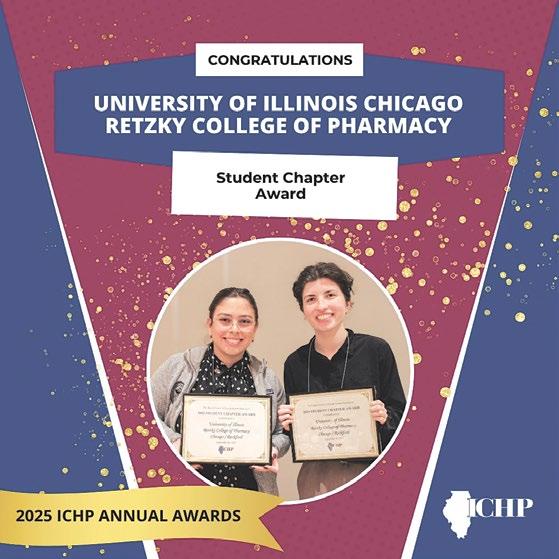
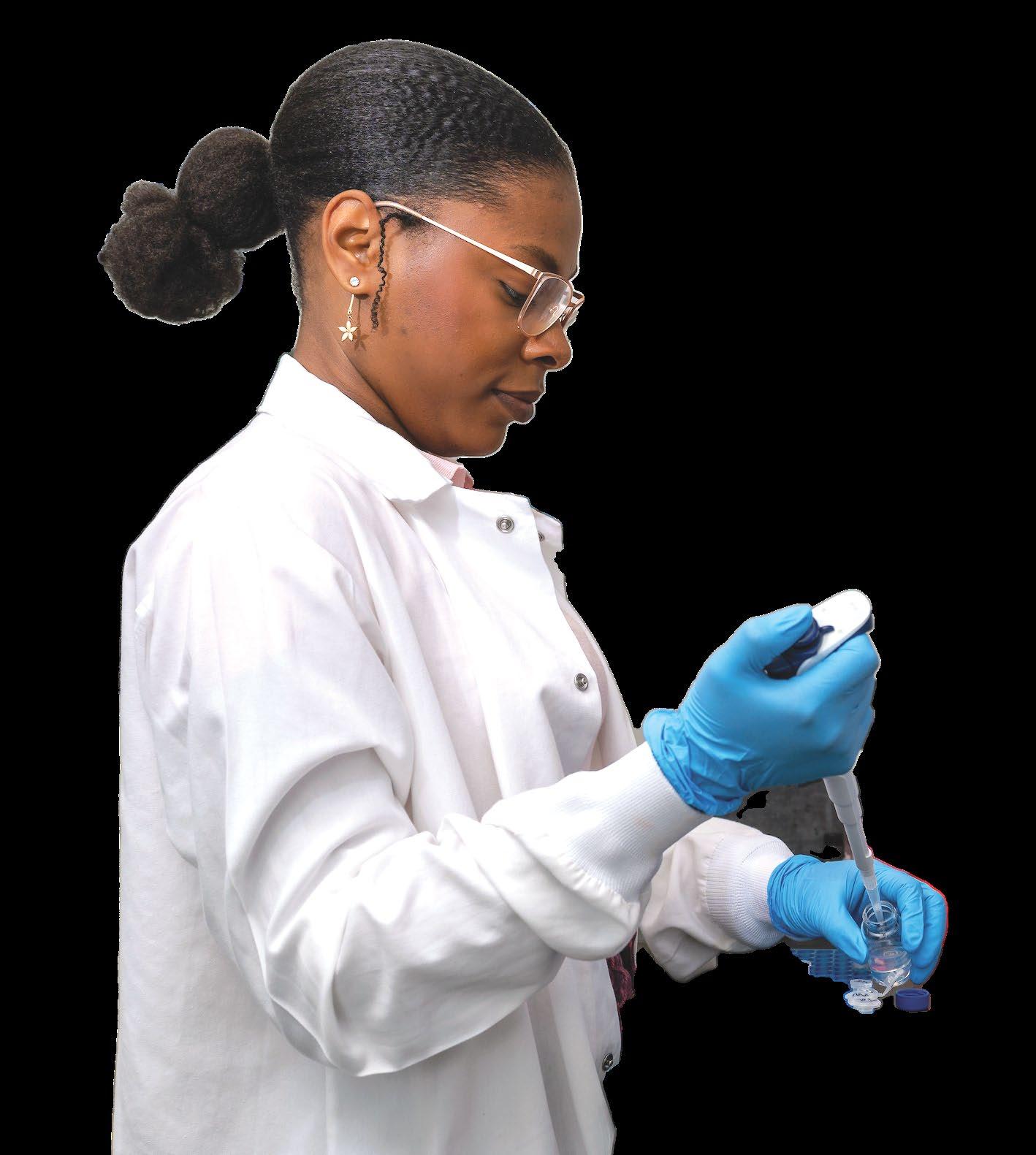
The UIC Retzky College of Pharmacy received the 2025 Higher Education Excellence and Distinction (HEED) award from Insight into Education . The award recognizes colleges that “support excellence in student success, employee recruitment...welcoming environments where everyone can achieve success.”
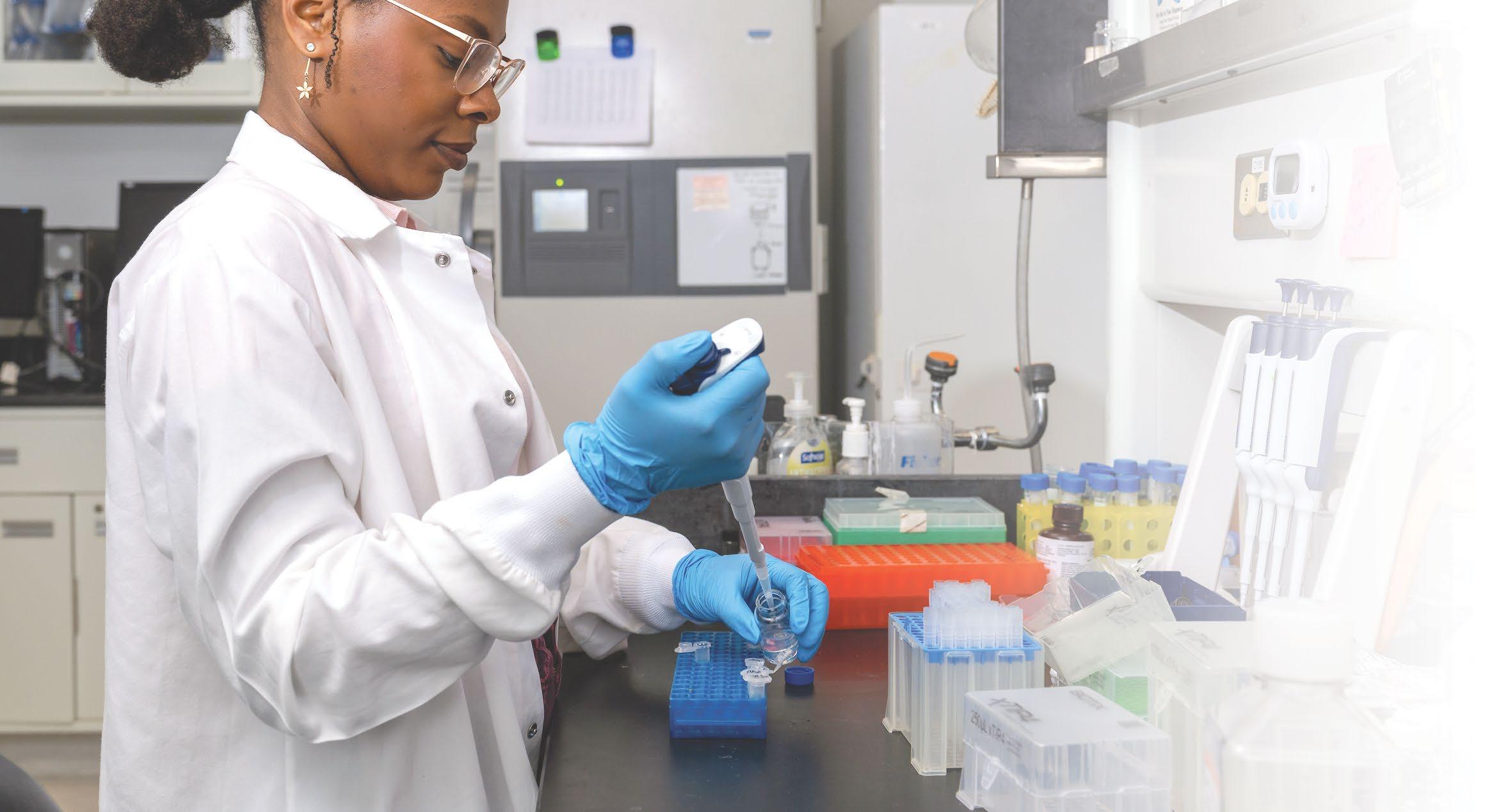

BY LAURA HAYES
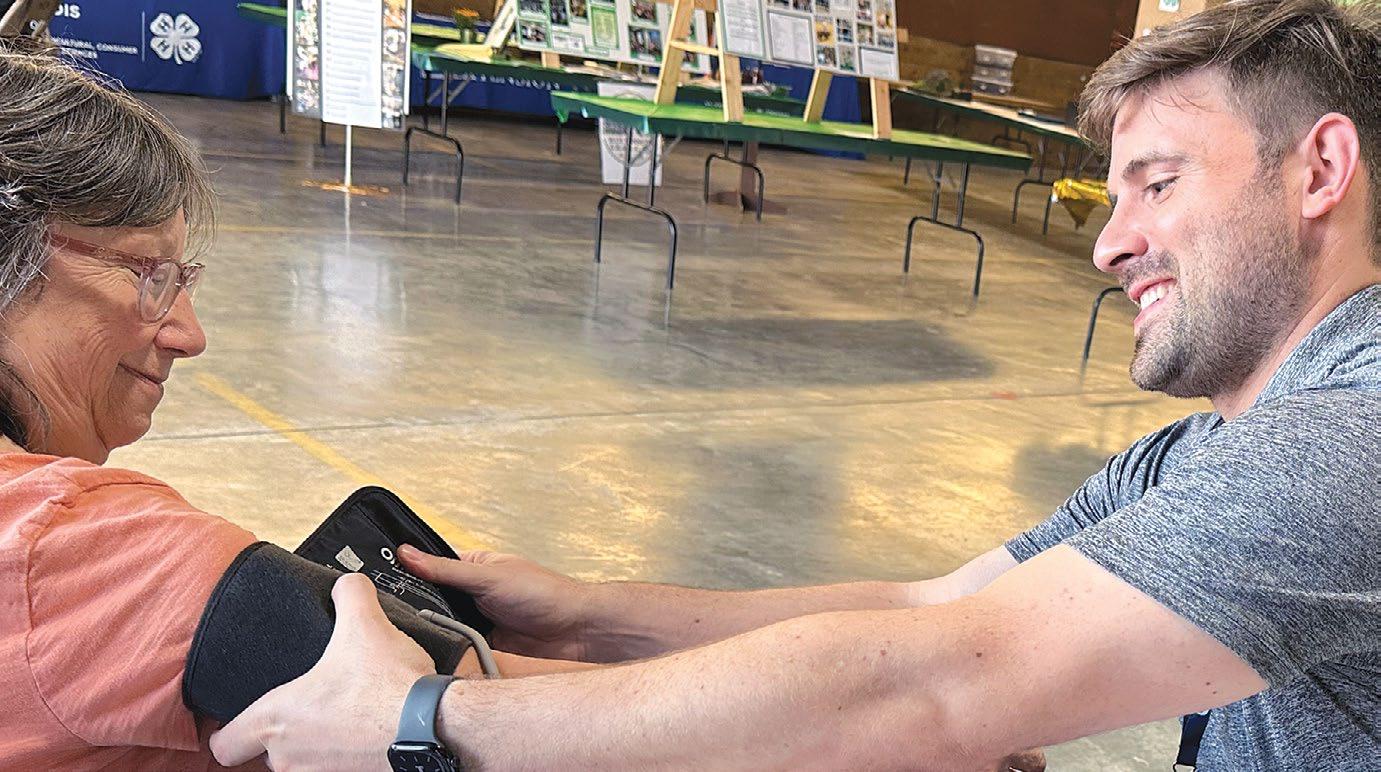
For many Illinois residents, summer brings the familiar sights and sounds of county fairs: live music, livestock shows, and the smell of funnel cake in the air. But thanks to the University of Illinois Chicago (UIC) Retzky College of Pharmacy, these fairs offer something else: potentially life-saving health care.
In partnership with Illinois Extension and Senior Connections, the UIC team sets up free blood pressure screening stations each year at the Stephenson, Boone, and Winnebago County fairs. These stations are staffed by UIC faculty, student pharmacists, and pharmacy residents, many of whom live and work in the surrounding communities.
“Blood pressure screenings at our local county fairs offer more than just a quick check,” says Erin Carson, Clinical Assistant Professor at UIC Pharmacy. “They are a chance for our students and clinicians to connect with our local community in a meaningful way.”
And that connection is making a difference.
High blood pressure affects nearly one in two adults in the U.S., yet it often goes unnoticed until it leads to serious complications like heart disease or stroke. Dubbed the “silent killer,” it can be managed, but only if people are aware of it in the first place. That’s where the screenings come in, and pharmacists can play a key role in providing education and support. Having access to free screenings allows community members to increase their awareness of what risk factors they have for high blood pressure. Lifestyle changes and proper medication management can make a significant change in their lives.
At the fairs, each participant receives an individualized assessment of their blood pressure, along with education about their risk factors and personalized advice.
“These events help identify individuals who need closer follow-up,” Carson explains. “We talk with people who haven’t seen a health care provider in years and others whose blood pressure has changed unexpectedly. Every conversation matters.”
The low-pressure (pun intended) setting of a county fair helps break down barriers that might keep people from seeking medical advice. And with pharmacists on hand, fairgoers can ask important questions about their medications, side effects, and lifestyle changes, all without needing an appointment.
Beyond the numbers, the program is also building relationships.
“We often see the same faces year after year,” Carson notes. “We talk with these fairgoers about everything from medication side effects to how to enjoy fair food while managing high blood pressure. These conversations spark real change.”
By meeting people where they are, the UIC team is showing just how vital pharmacists can be to community health, especially in rural areas where medical access can be limited.
As the program continues to grow, so does its impact. What began as a few blood pressure checks at local fairs has become a trusted resource for education, support, and meaningful connection.
And for many Illinois residents, that quick stop at the pharmacy tent could be the first step toward a longer, healthier life.

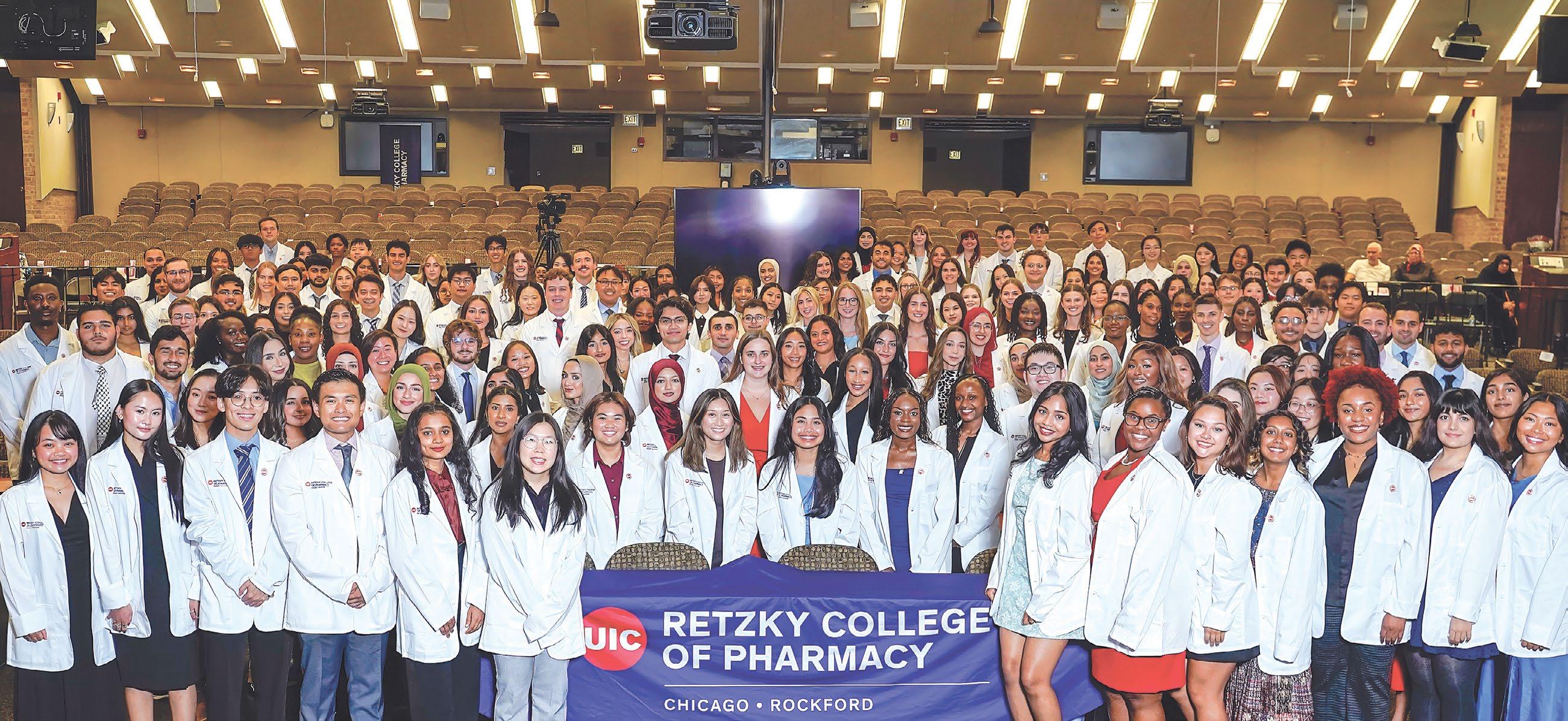
We had a wonderful time welcoming the Class of 2029 into the pharmacy profession on August 21, 2025! Special thanks to our pharmacist alumni coaters for helping to make the annual White Coat Ceremony a great success:
Chicago Alumni Guest Coaters
Shaqin Fatak, PharmD 2015
Ernie Kaminski, BSPharm 1979, MD 1983
Samina Mohiuddin, PharmD 1993
April Peregrino, PharmD 2004
Frank Svete, PharmD 2000
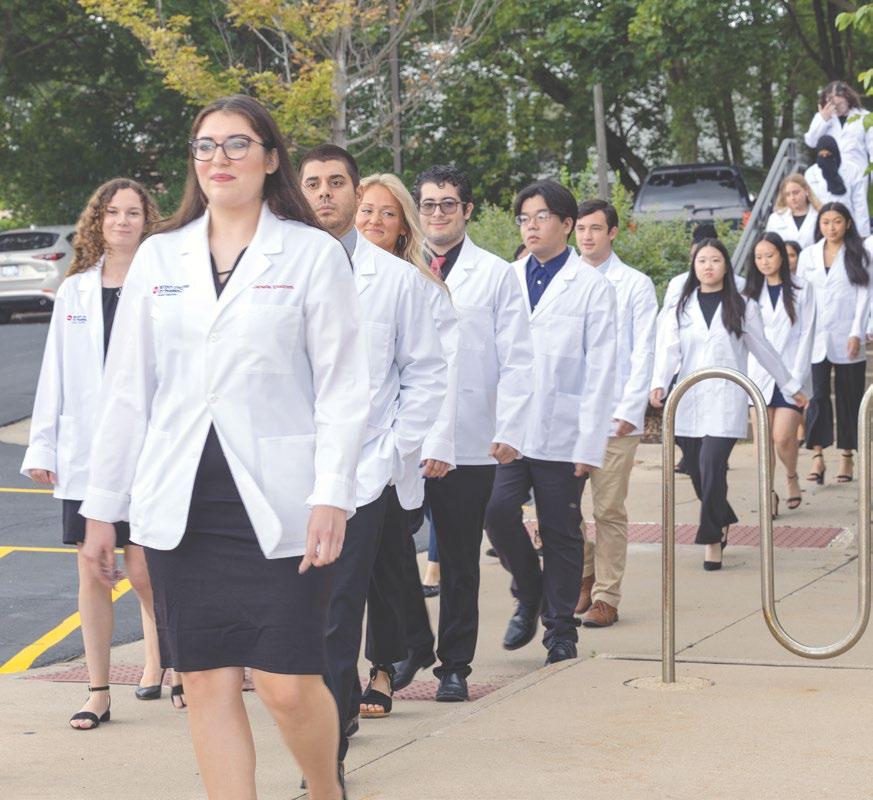
Rockford Alumni Guest Coaters
Jaimie Hurd, PharmD 2021
Manar Kandil, PharmD 2018
Watch the ceremony livestream at go.uic.edu/whitecoat29

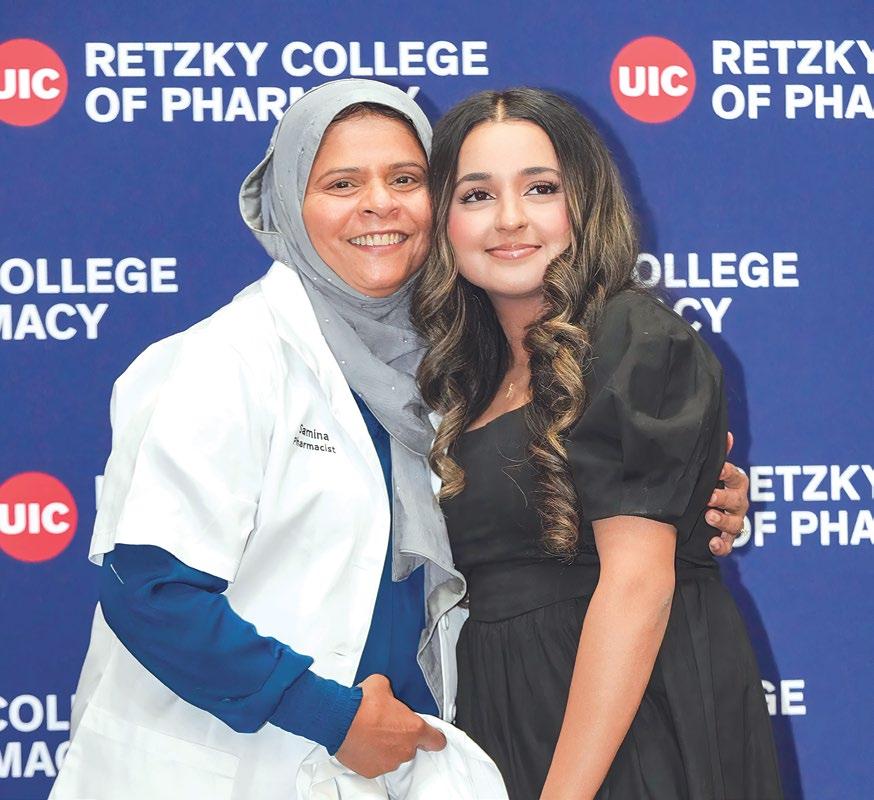
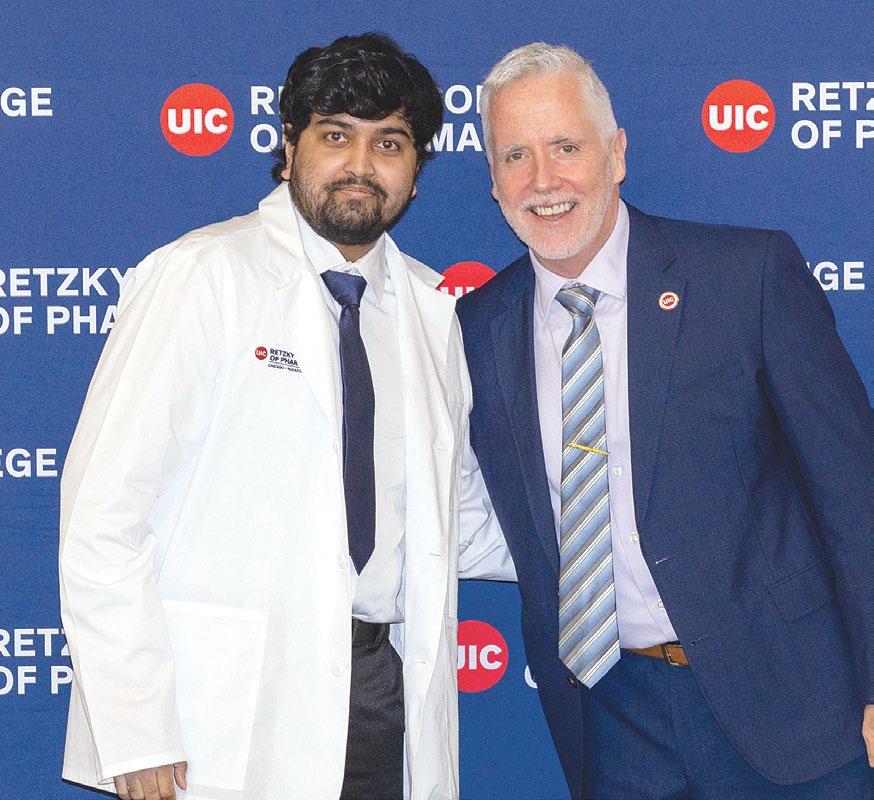
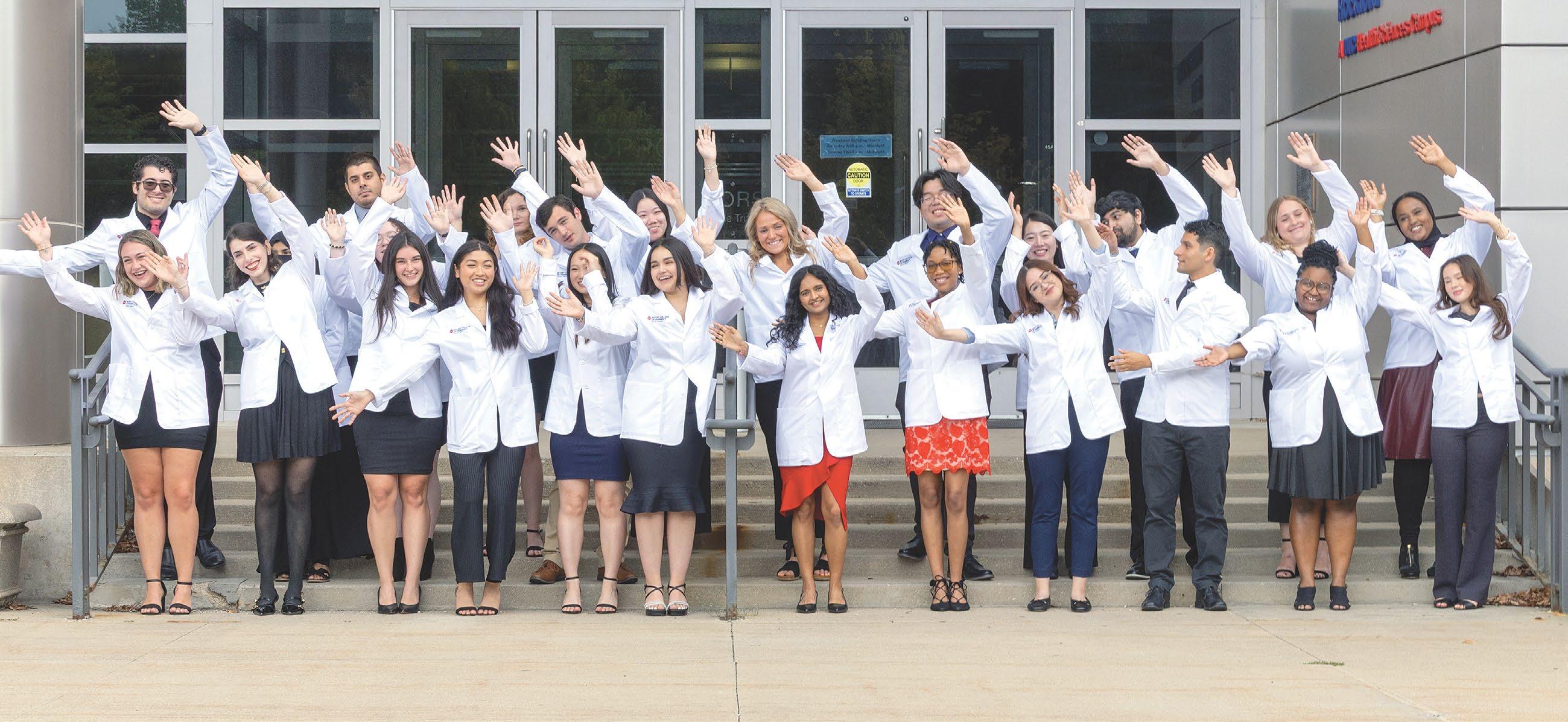
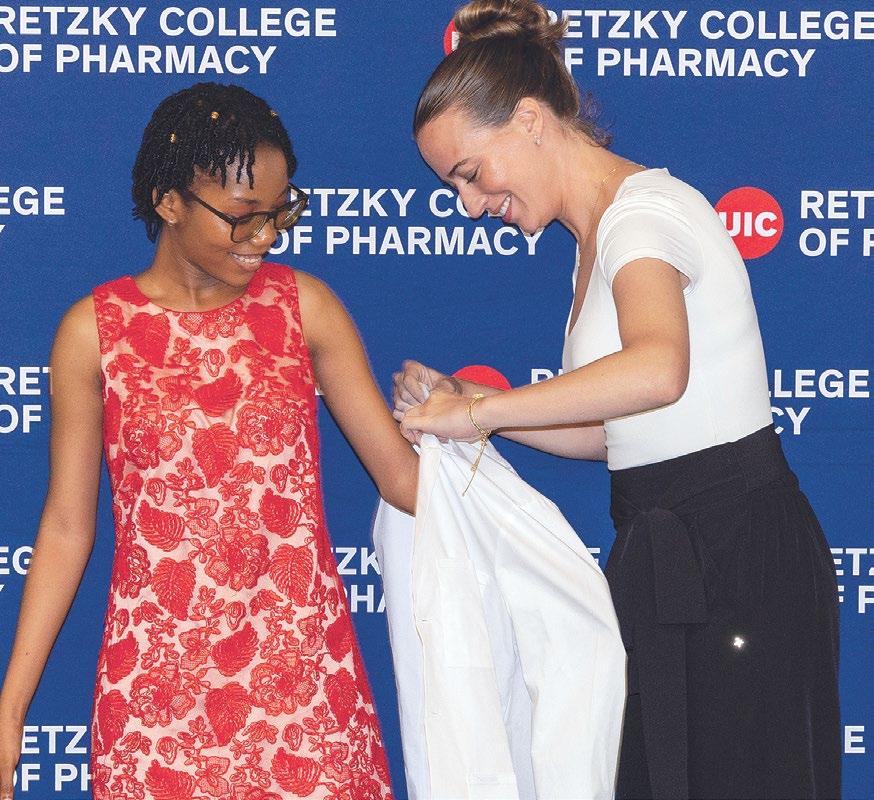
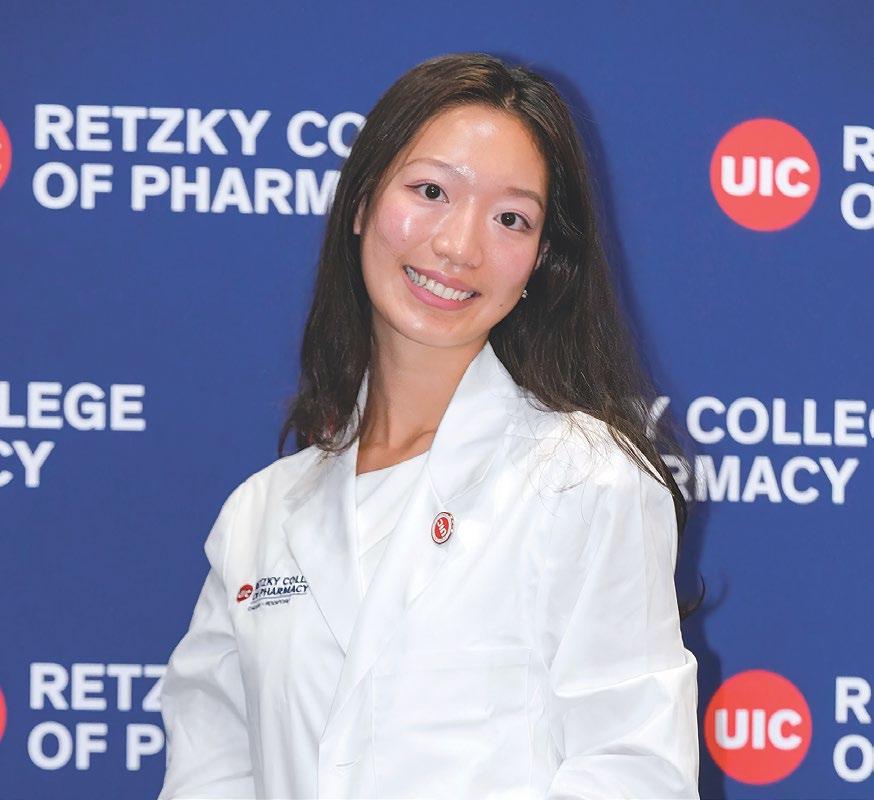
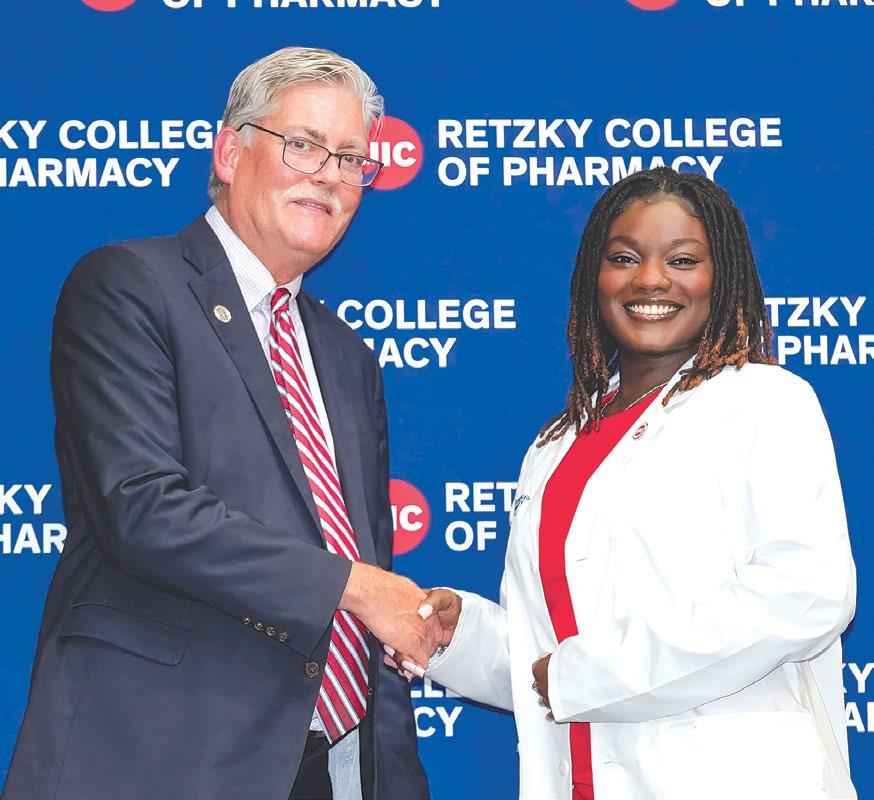
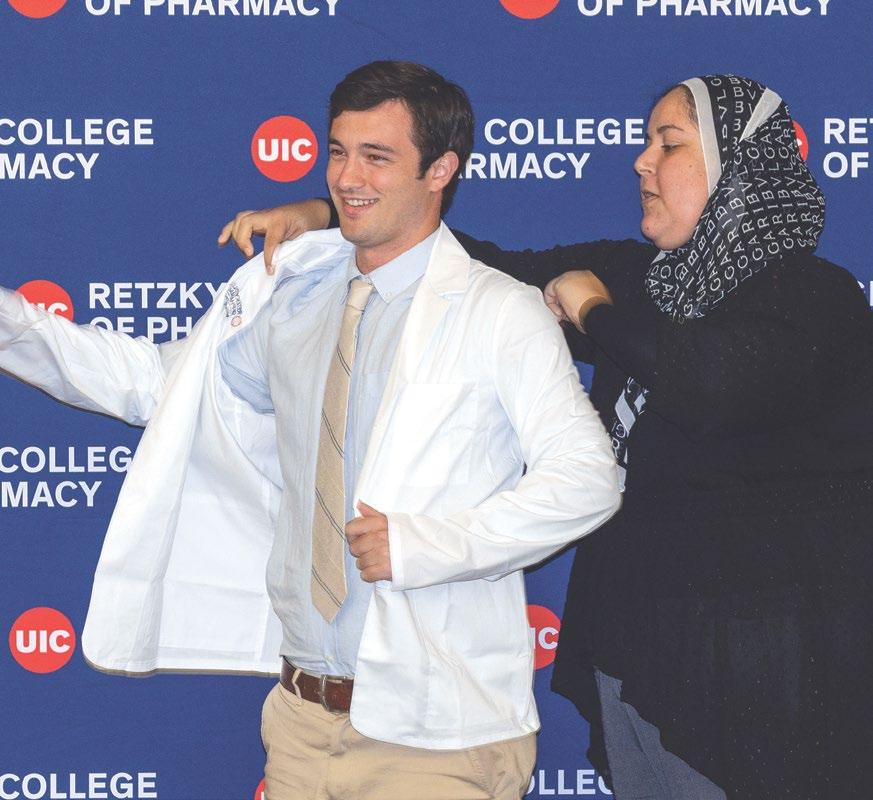
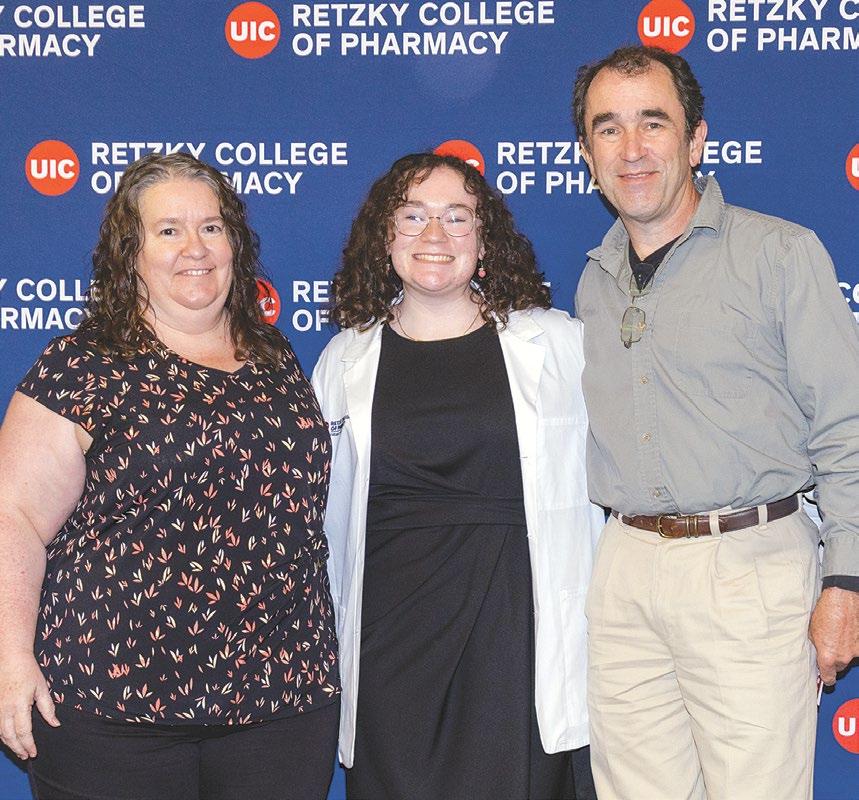
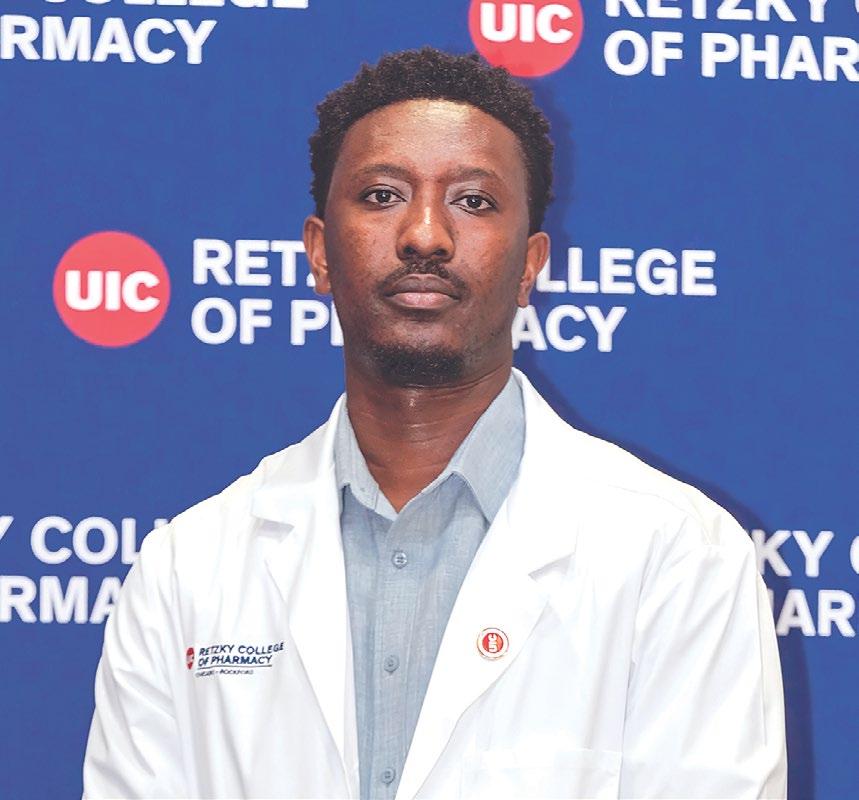
of 36% from last year. Get to know the Class of 2029 student pharmacists:
25% ARE FIRST-GENERATION STUDENTS
AVERAGE AGE: 23 YEARS
AVERAGE GPA: 3.52
P1 STUDENTS ARE FROM 19 COUNTRIES AND TERRITORIES AND SPEAK 21 LANGUAGES
23% ARE UNDERREPRESENTED MINORITIES (URM) IN HEALTHCARE

in operating UI Health’s seven ambulatory pharmacies, the UIC Retzky College of Pharmacy contributes to a more vibrant UI Health system while also creating a lively environment for students and faculty.
BY DANIEL P. SMITH

Though she leads an ambulatory pharmacy filling upwards of 700 daily prescriptions within the fast-moving UI Health enterprise, Dr. Monazzah Sarwar PharmD ’06 speaks with a surprising calmness. Her words arrive measured and precise. She is patient and purposeful, unapologetically mission oriented and undeniably well versed on the particulars of the Specialty Care Building (SCB) Pharmacy she calls her professional home.
As associate director of the SCB Pharmacy since October 2022, Sarwar leads UI Health’s highest prescription volume pharmacy. One of seven ambulatory UI Health pharmacies operated by the UIC Retzky College of Pharmacy, the SCB Pharmacy serves patients receiving care at SCB, a modern, three-year-old facility on the UIC campus featuring an outpatient surgical center as well as five specialty clinics covering areas such as ophthalmology, transplant, and gastroenterology.
SCB pharmacists produce sterile and non-sterile compounds, provide immunizations, and mentor a rotating array of PharmD students and pharmacy residents as well as other health sciences trainees. The pharmacy also directs the Medication Assistance Program to support the uninsured and functionally uninsured as well as the Meds to Beds Program
assuring patients discharged from the UI Health Hospital leave with their medications in hand. Days, Sarwar says, are never boring, never the same.
“Pharmacists at SCB have a wide range of different skill sets and they’re using them every day to deliver for patients,” Sarwar says.
The work of pharmacists at SCB and UI Health’s six other ambulatory pharmacies contributes to a more vibrant UI Health system while also unlocking unique benefits for patients, clinicians, students, and faculty members as well.
“A differential advantage,” UIC Retzky College of Pharmacy Dean Dr. Glen Schumock says. “Because the college is running the pharmacies, which is unique among schools of pharmacy in the U.S., the UI Health system is better positioned to care for patients and our people are getting access to opportunities that don’t exist elsewhere.”
Having the seven ambulatory pharmacies embedded in the UIC community enlivens the UI Health enterprise. By bringing its excellence in training, discovery, policy, and service to UI Health and running the
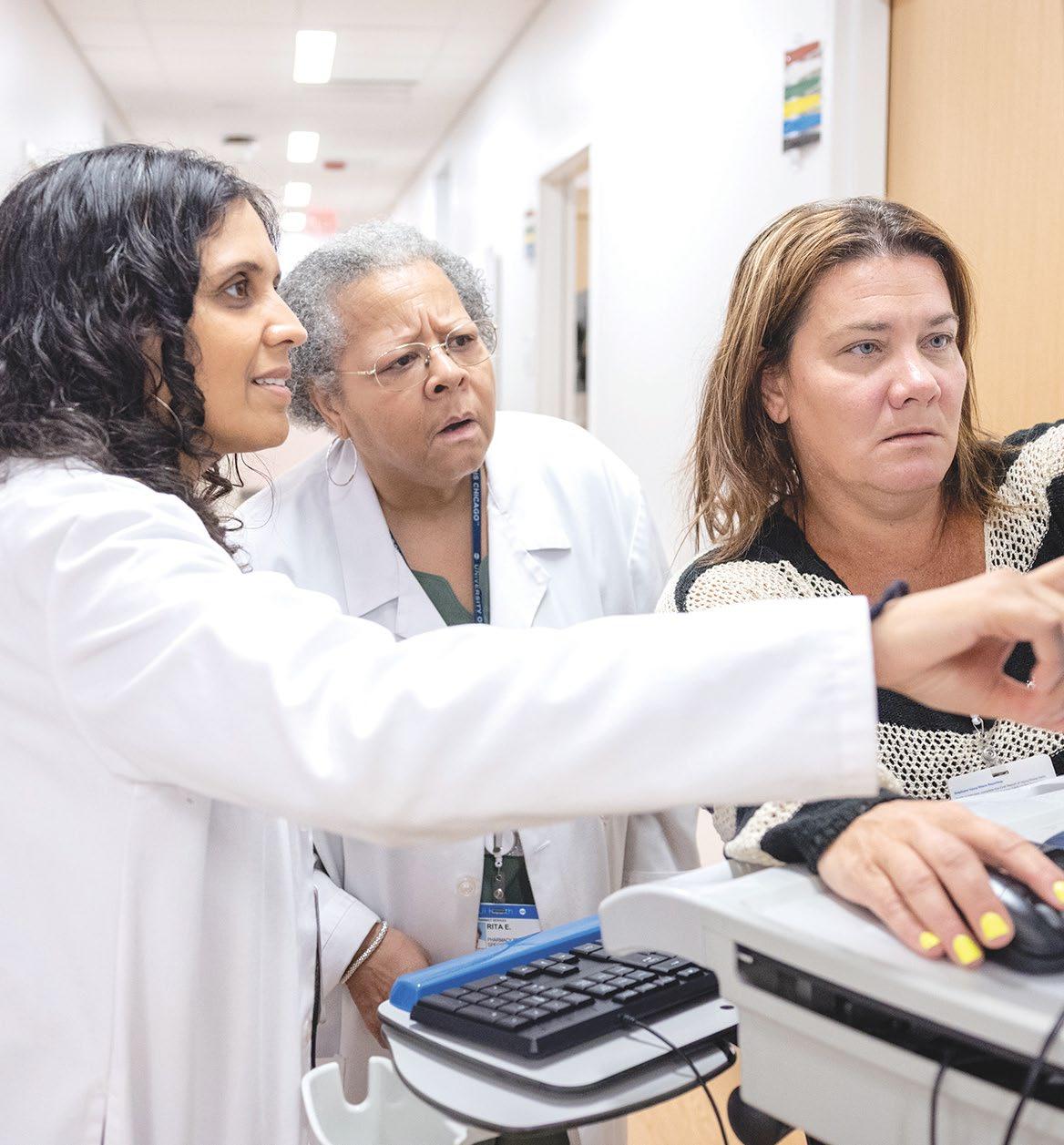
seven ambulatory pharmacies, the UIC Retzky College of Pharmacy contributes to a more vibrant and responsive health system for patients, providers, and trainees.
Most notably, the college-operated pharmacies bolster patient care. As all seven pharmacies exist on Epic, UI Health’s electronic health record software system, pharmacists can access patient charts and communicate with UI Health clinicians more seamlessly to fuel improved patient outcomes.
“This alone saves time for patients and heightens continuity of care,” Sarwar says.
UI Health Chief Ambulatory Medical Officer Dr. Rakhi Thambi calls the ambulatory pharmacies’ presence on Epic a gamechanger because it allows pharmacists to see what's happening with patients. If individuals need medical drug assistance, then pharmacists can steer them to an appropriate program. If insurance will not cover a specific therapeutic agent, then pharmacists can switch the patient to a comparable alternative without having to call the doctor for permission.
The college-led pharmacies routinely customize programs and medication preparation to meet specific clinical needs as well. The SCB Pharmacy, for example, regularly compounds ophthalmic medications not routinely available elsewhere for patients at UI Health’s Ophthalmology Clinic.
“We work closely with our pharmacists and trust them,” says Thambi, who has been with UI Health for two decades.
“We know our ambulatory pharmacies are vested in our patients, and we appreciate a streamlined, collaborative relationship focused on improving quality of care.”
Leveraging more than a century of innovation in pharmacy practice, the college develops advanced pharmacy practice models centered on improving
patients’ medication-related outcomes and quality of life, transcending what many peer pharmacies can do for patients.
For instance, providers across UI Health can refer their patients on complex medication regimens to the college-run Medication Therapy Management (MTM) program housed in the Outpatient Care Center (OCC) Pharmacy. There, MTM pharmacists collaborate with OCC pharmacists to coordinate medication refills, pill box preparation, and monthly assessments with enrolled patients to improve adherence and avoid medication-related complications in patients. The SCB Pharmacy, meanwhile, has layered on additional efforts, such as blood pressure screenings and continuous glucose monitoring to boost health outcomes.
“The UIC Retzky College of Pharmacy is known to set practice standards and innovate and that’s apparent in our work as a part of UI Health,” says Dr. Edith Nutescu, head of the Department of Pharmacy Practice at the college. “The pharmacies embedded in the UI Health community allow us to develop and offer pharmacy services and patient-support programs not commonly found elsewhere in community-based pharmacies.”
UI Health Vice Chancellor for Health Affairs Dr. Robert Barish recognizes this benefit and is grateful for college leadership who stand devoted to patient care and advancing pharmacy practice across the UI Health enterprise.
“This integrated approach benefits the health system by allowing for more direct ownership and management of our pharmacy services to respond and adapt quickly to patient and community needs,” he says. “This personalized approach to health care delivery reflects the access and excellence that we provide across our academic health enterprise.”
And that, Schumock reminds, is a foremost priority at the college.
“Ultimately, we serve people—our patients, our health care partners, and our students—and that commitment shines in our work at UI Health’s ambulatory pharmacies,” he says.
While operating UI Health’s seven ambulatory pharmacies, the UIC Retzky College of Pharmacy unlocks value for its students and faculty while simultaneously driving the college’s overall performance as well.


Students have access to convenient and diverse training opportunities to expand their knowledge base and prepare for the contemporary health care climate, which includes working on collaborative teams with providers. Through rotations at the ambulatory pharmacies, UIC PharmD students participate in medication dispensation, delivery, and vaccination services while interacting directly with practicing pharmacists, physicians, and patients. The firsthand experience prepares UIC students for real-world practice across a wide range of locations and specialty fields.
“Within blocks of the College of Pharmacy building, our students can enter one of our ambulatory pharmacies and get practical experience in a setting led by a college clinical faculty member,” Schumock says. “It creates more seamless learning opportunities for our students to get rich experiences and pursue interesting research projects.”
Following rotations, many students work in the ambulatory pharmacies as externs, where they earn income while also accumulating more valuable experience to both enhance their learning and strengthen their candidacy for future jobs and residency positions.
“Not to mention students working in our pharmacies, either on rotation or as externs, are building a network of mentors with our practicing pharmacists,” Nutescu adds.
Notably, UI Health ambulatory pharmacists like Sarwar all have a faculty appointment at the college, which offers them a unique opportunity to shape the future of pharmacy by both training the next generation of pharmacists and innovating new standards of practice to elevate patient care. Blending
responsibilities in academia and practice, clinical faculty pharmacists develop elective courses aligned with rising health care trends and leverage college resources, from IT support to biostatisticians, to imagine new standards of practice.
“A lot of pharmacists want to come and work here because of the affiliation with the college,” says Sarwar, herself a clinical assistant professor in the Department of Pharmacy Practice. “You feel you’re giving back to the community, which includes patients but also the future of the profession.”
The college, meanwhile, captures its own benefits from its unique and longstanding arrangement as operator of the health system’s ambulatory pharmacies. On a reputational level, the college’s ability to test and implement improved pharmacy practice models in its own pharmacies stimulates innovation and propels the college’s standing as a national and global leader in the field. On a practical level, the college collects income from its services to support additional patient-centric programming while pharmacists doubling as clinical faculty ensure consistent alignment in PharmD training.
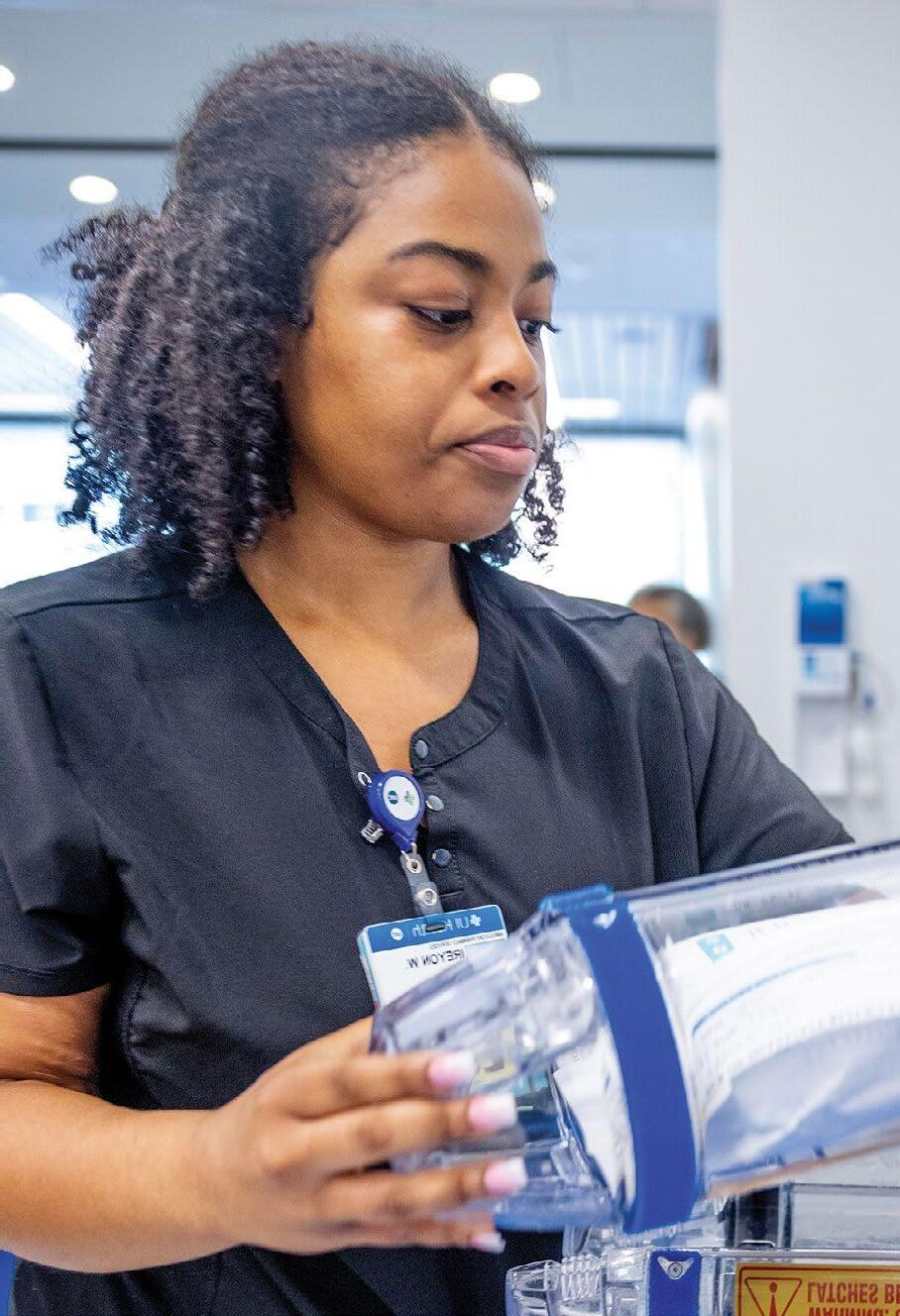

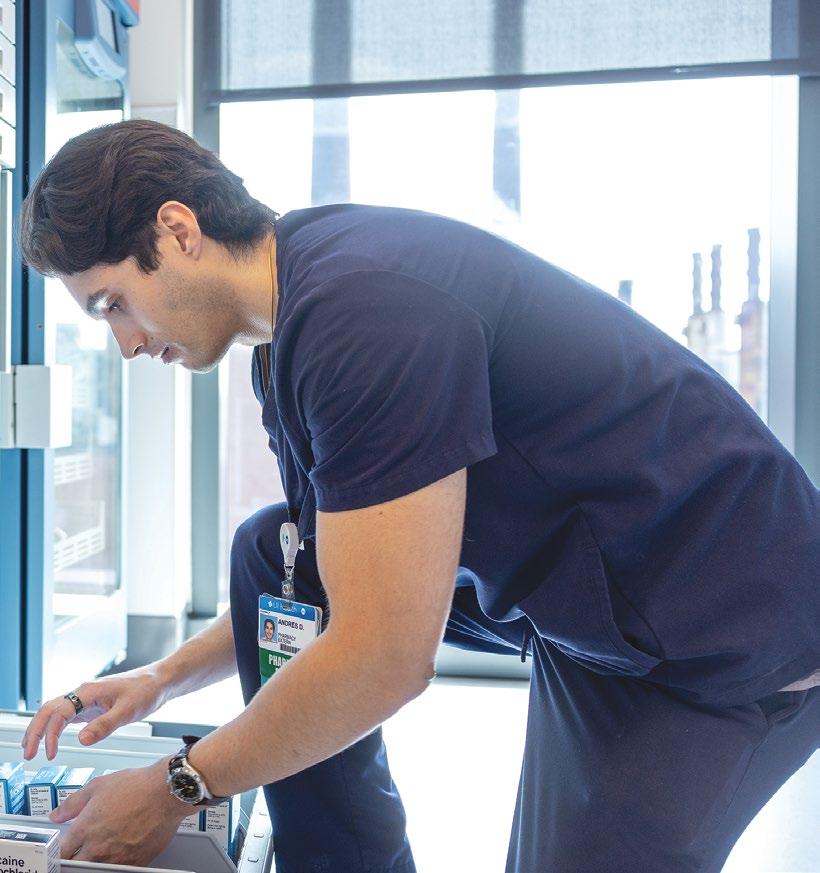
“Our college is undoubtedly stronger because of our role operating UI Health’s ambulatory pharmacies,” Schumock says. “It provides necessary care to patients and empowers innovation in pharmacy practice to serve communities near and far while also supporting student training, all of which is core to our mission at the college.”
1801 W. TAYLOR ST.
Partnered with UI Health’s Outpatient Care Center
Dermatology Clinic, this pharmacy specializes in compounding specialized dermatologic products that are not commercially available.
1220 S. WOOD ST.
The Mile Square Health Center Pharmacy provides prescription services and medication financial assistance to patients of the Mile Square Health Center, a Federally Qualified Health Center residing immediately south of UIC’s West Campus. In addition, this pharmacy supports the onsite urgent care center, substance use disorder program, and off-site medication use at UI Health’s 10 other Mile Square clinics, including four school-based locations.
1801 W. TAYLOR ST.
Located in UI Health’s Outpatient Care Center Infusion Center, the Oncology Clinic Pharmacy is responsible for the preparation and monitoring of chemotherapy and other specialized infusions for the cancer population treated by UI Health clinics.
1801 W. TAYLOR ST.
This Taylor St.-based pharmacy supports patients receiving treatment in UI Health’s Outpatient Care Center (OCC) clinics who have acute medication needs. The OCC Pharmacy also provides prescription support to UI Health’s Medication Therapy Management program and operates an advanced medication adherence program targeting patients with hypertension, diabetes, and other chronic conditions.
1009 S. WOOD ST.
UI Health’s highest prescription volume pharmacy, the SCB Pharmacy provides specialized support for ophthalmology, otolaryngology, same-day outpatient surgery, transplant, and dialysis services in addition to UI Health clinic patients with acute medication needs. The SCB Pharmacy also administers immunizations in addition to operating state-of-the-art compounding services, the Meds to Beds program supporting patients being discharged from the hospital, and the Medication Assistance Program.
722 W. MAXWELL ST.
On UIC’s East Campus, the University Village Pharmacy is the preferred site for UIC students and supports the student health plan. The pharmacy provides convenient immunization services for influenza, travel vaccines, and other preventable illnesses.
840 S. WOOD ST.
A closed-door facility, the Wood Street Pharmacy supports dispensing for UI Health’s specialty pharmacy, which provides medication and disease state management for patients receiving high-risk, highcost, limited distribution medications with specific monitoring and dispensing requirements. The Wood Street Pharmacy also oversees dispensing to the Illinois Department of Corrections, transplant patient maintenance therapy services, and UI Health’s mail order program. Finally, the pharmacy operates a call center, prior authorization support, and extensive patient education, including self-injection training.



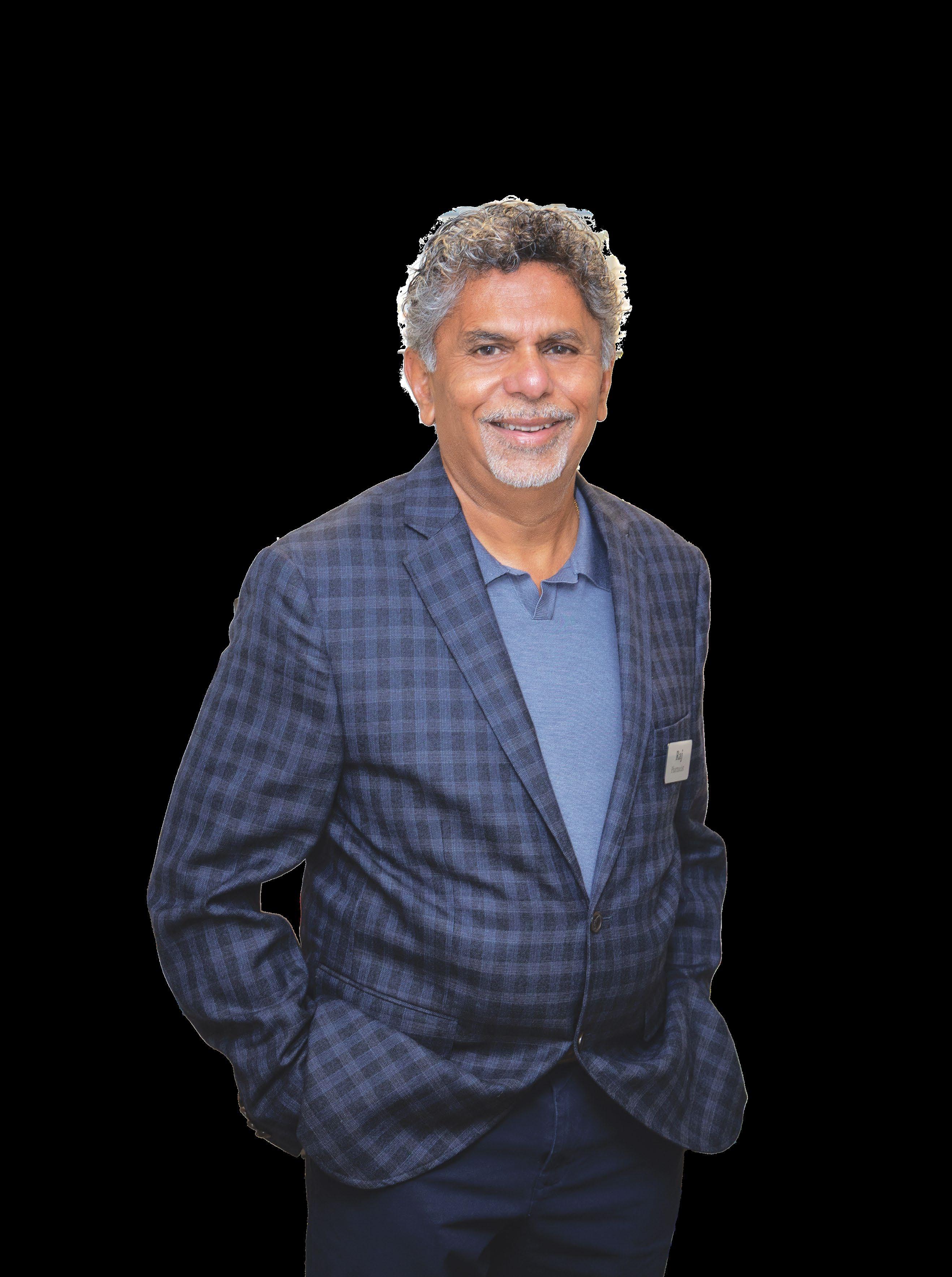
BY JESSICA CANLAS
On any given weekday in downtown Rockford, you’ll find Rajesh Patel, RPh, behind the counter at Downtown Discount Drugs, greeting patients by name, checking on their families, and answering questions that extend far beyond prescriptions. For nearly 40 years, Patel has been the kind of pharmacist who knows his patients’ stories as well as their medications—an approach that has made him a trusted figure in a city where independent pharmacies have largely disappeared.
Now, Patel’s role as a community anchor is growing even larger. Thanks to a partnership with the Illinois New Stores in Food Deserts program, Patel has expanded his
pharmacy to include City Center Market, a full-service grocery and wellness hub designed to combat food insecurity in Rockford’s Downtown West corridor.
To Patel, being a pharmacist has always been about more than filling prescriptions.
“It’s about caring for people,” he says.
The opportunity to open a grocery store to help address the food insecurity that his own patients were experiencing was a no-brainer for Patel. He believes providing access to healthy food is as essential to health as medicine.
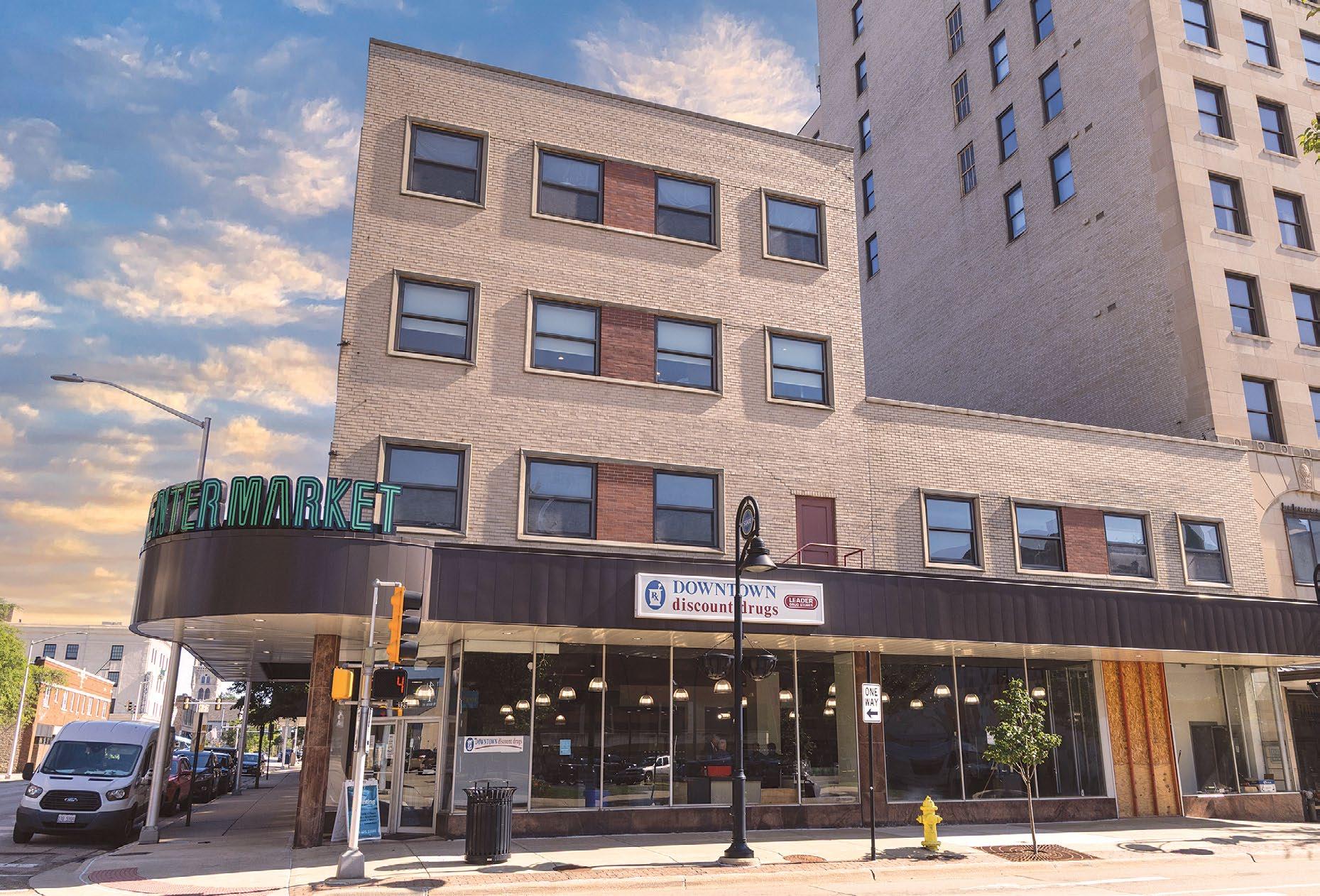
[My patients] remind me why community pharmacy matters. We care for people who need someone on their side
Patel’s story in Rockford began in 1986, when he moved from South Chicago to open a small pharmacy inside a clinic. The practice was modest—just 1,500 square feet— but it thrived thanks to the relationships Patel and his late wife, Smita, built with patients. Over time, Downtown Discount Drugs became a neighborhood fixture.
Along the way, Patel faced pressures familiar to many independent pharmacists: shrinking insurance reimbursements, competition from chain pharmacies, and the financial uncertainty of operating in lowerincome neighborhoods. When the big-box pharmacies moved in, smaller independents either left or sold, but Patel stood his ground. He didn’t want someone else dictating how he ran his business.
“When it comes to service, independent pharmacies can’t be beat,” he says. “You talk to your patients. They see you and get to know you and trust you.”
Located in one of Rockford’s lower-income neighborhoods, Downtown Discount Drugs has long cared for patients who are often overlooked—including seniors and individuals living with mental illness.
“They are the best people,” says Patel. “They remind me why community pharmacy matters. We care for people who need someone on their side.”
Many of his patients struggle to stay consistent with their medications, and Patel has built relationships strong enough that when he calls to remind them to take their medicine, they listen.
That philosophy has earned Patel enduring loyalty. Patients often share stories of him extending credit until payday, hunting down manufacturer coupons, or personally calling physicians to expedite prior authorizations so prescriptions would be covered.
Luciette Bevineau has been coming to Downtown Discount Drugs for more than 40 years. During a period of time when she was struggling financially as a newly single mom of three, Patel allowed her to pick up medications on trust alone.
“If my kid was sick, and I didn’t get paid until Friday, he would say, ‘Go ahead and take this medicine, and you can pay me on Friday.’ Big box stores don’t want to hear about your personal problems. Raj was different because he cares and has helped me out a lot over the years. So I’m still going to be a loyal customer.”
The concept for City Center Market began with a simple observation: Downtown Rockford was booming with new apartments and businesses, but residents–including a large population of elderly and mentally ill–had nowhere nearby to buy fresh groceries. The closest supermarkets were miles away, leaving downtown officially designated as a “food desert.”
When Patel witnessed the model of a full-service pharmacy integrated with a grocery store at a conference, an idea was born. He already owned a vacant building adjacent to his pharmacy—space he had purchased in the mid-1990s but never developed—and he was well aware of his neighbors’ challenges with access to fresh food.
With encouragement from Alderman Tamir Bell and support from State Representative Maurice West and Senator Steve Stadelman, Patel applied for funding through the Illinois Grocery Initiative, a statewide effort to address food insecurity. In May, he was awarded $165,000 to launch City Center Market.
The grant helped Patel transform the long-empty space into a welcoming grocery store offering fresh produce, dairy items, pantry staples, a deli counter and even fresh juice. The market also houses shipping services and will eventually feature a nurse practitioner clinic, creating a true one-stop shop for wellness needs.
“Mr. Patel has been a pillar of this neighborhood for decades,” says Alderman Bell. “He’s not just there to run his business. He’s there to serve his community, and he really cares. He recognized the need, and his decision to invest in fresh-food access is a game-changer for our Downtown West area.”
City Center Market is only part of Patel’s vision. Drawing inspiration from a mobile grocery program in Milwaukee, he is partnering with the Northern Illinois Nonprofit Center for Excellence to launch a mobile market—an 18-foot truck outfitted with aisles, refrigeration, and wheelchair access— that will bring groceries directly to residents of senior housing complexes and underserved neighborhoods.
Community advocates see enormous potential. “So many of our clients have limited mobility and no easy access to grocery stores,” says Zel Coleman, case manager at the Rosecrance Ware Center, a nearby outpatient mental health facility. “The Mobile Market means they won’t have to wait until Monday for me to take them shopping.
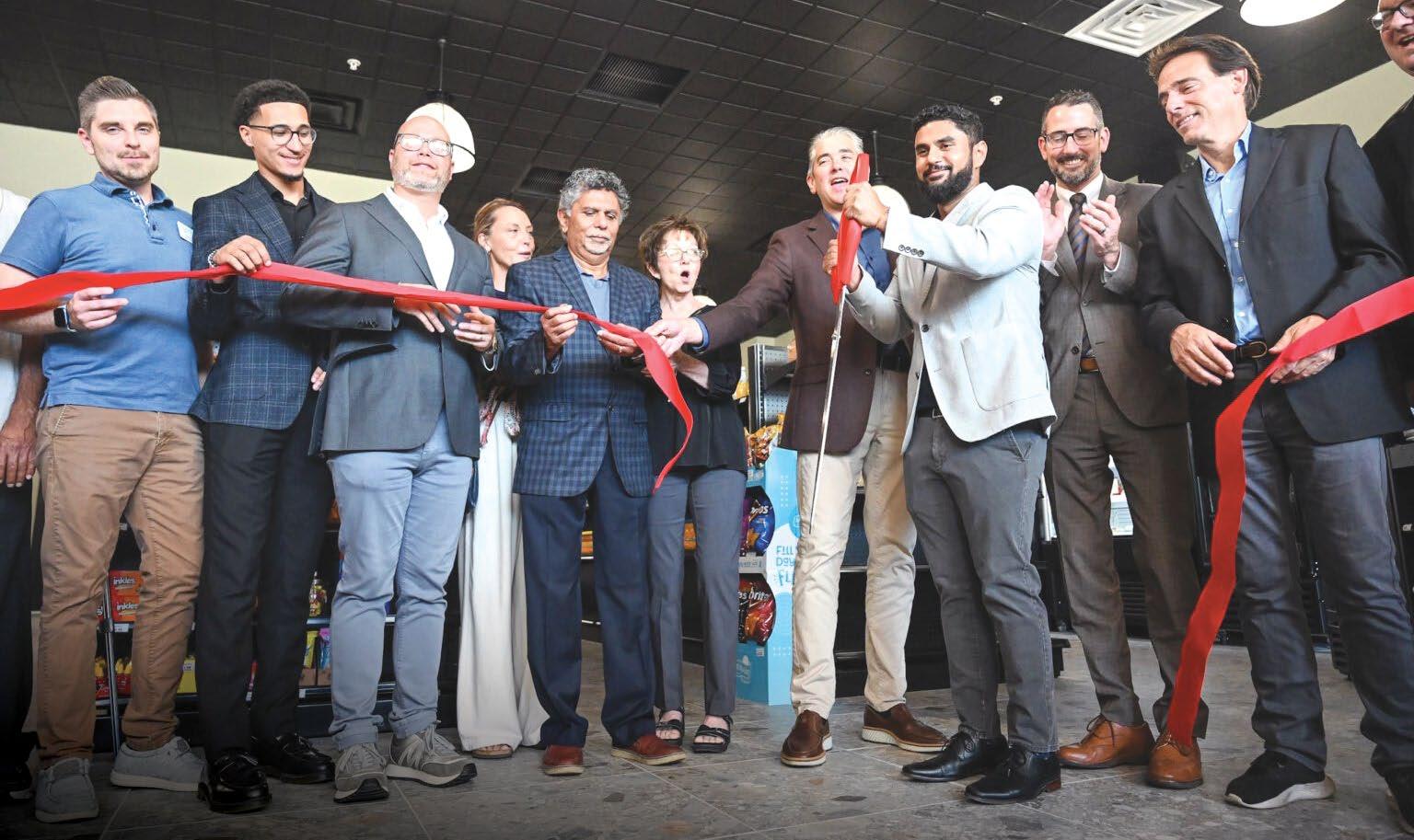
“This will be great for everybody.”
Though Patel’s daily work has kept him busy in Rockford, his ties to the UIC Retzky College of Pharmacy run deep. His daughter Amolee earned her PharmD at UIC in 2019, and now practices with a specialty in infectious disease in Milwaukee. His son Ashay is also a pharmacist, and the two now practice side by side at Downtown Discount Drugs.
Patel himself has served as a preceptor for UIC student pharmacists for more than 15 years, mentoring learners interested in retail pharmacy. His family even established the Patel Family Scholarship at UIC, which has supported students pursuing careers in community pharmacy.
“Raj is a pillar in the community and an excellent role model,” says Kevin Rynn, clinical professor and dean of UIC Pharmacy’s Rockford campus. “He and his family exemplify compassion and empathy to our students and show the impact of having excellent pharmacists in the community setting.”
Patel met his current wife, Ann, a nurse, when she worked at an inner city clinic and would bring patients they had in common in to fill their prescriptions. Today, she plays an important role in their community work by building relationships with the local community. Together, the couple has supported flu and COVID vaccination clinics, worked with assisted living facilities, and continued to serve Rockford’s most vulnerable residents.
“It is more like family than a pharmacy,” says Dorothy Reddic, former case manager at what is now the Rosecrance Ware Center. She recalls when Patel helped her patients get their medications despite their lack of insurance. More recently, Patel helped Reddic fill her own prescriptions with behind-the-scenes assistance when it seemed insurance wasn’t going to cover costs.
“They advise me on [health-related issues] I’m not even thinking about, things nobody else has brought up or questions I didn’t even know to ask,” says Reddic. “As long as they’re open, and I’m alive and able to go there, I will be getting my prescriptions filled there.”
With City Center Market officially open and the mobile market in the works, Patel is as busy as ever. Yet his motivation remains simple: caring for the community that has sustained him since 1986.
“Most pharmacies survive because they have a connection with patients,” he says. “I’d say I know 99 percent of my patients by name. I have patients come in and ask if they remember me because they used to come in with their grandparent. Now the connection is generational.”
As Rockford’s Downtown West continues its revival, Patel’s investment is both practical and symbolic. It demonstrates that locally owned, community-rooted businesses can thrive even amid shifting economic landscapes—and that pharmacists, in particular, have a unique role to play in public health.
BY JENNIFER FLYNN
Dr. Stephanie Crawford is known for introducing herself as the UIC Retzky College of Pharmacy’s most delightful faculty member. The unofficial title originated years ago, when she served on a hiring search committee.
Marking 33 Years of Teaching, Research and Service
“One of the external candidates we interviewed told me I was ‘most delightful.’ My colleagues and I had a good laugh. After that, I started saying it as a lighthearted way to introduce myself,” says Crawford, who is retiring this December after 33 years at UIC. She will leave her university posts as Executive Associate Dean for Faculty Affairs & Strategic Initiatives, Professor of Pharmacy Systems Outcomes and Policy, Associate Director for both the UIC Institute for Health Data Science Research and Center Affiliate at the Center for Pharmacoepidemiology and Pharmacoeconomic Research, and UIC Honors College Fellow.
While Crawford proclaims the most-delightful title in jest, people who know her say it’s accurate.
“Stephanie is delightful!” chuckles Todd Lee, Professor and Head of the Department of Pharmacy Systems Outcomes and Policy.
“She walks into a room and everyone gravitates to her. She just has a great way of connecting with people. But she also holds herself and the people around her to a very high standard. She works hard and has an acute sense of fairness.”
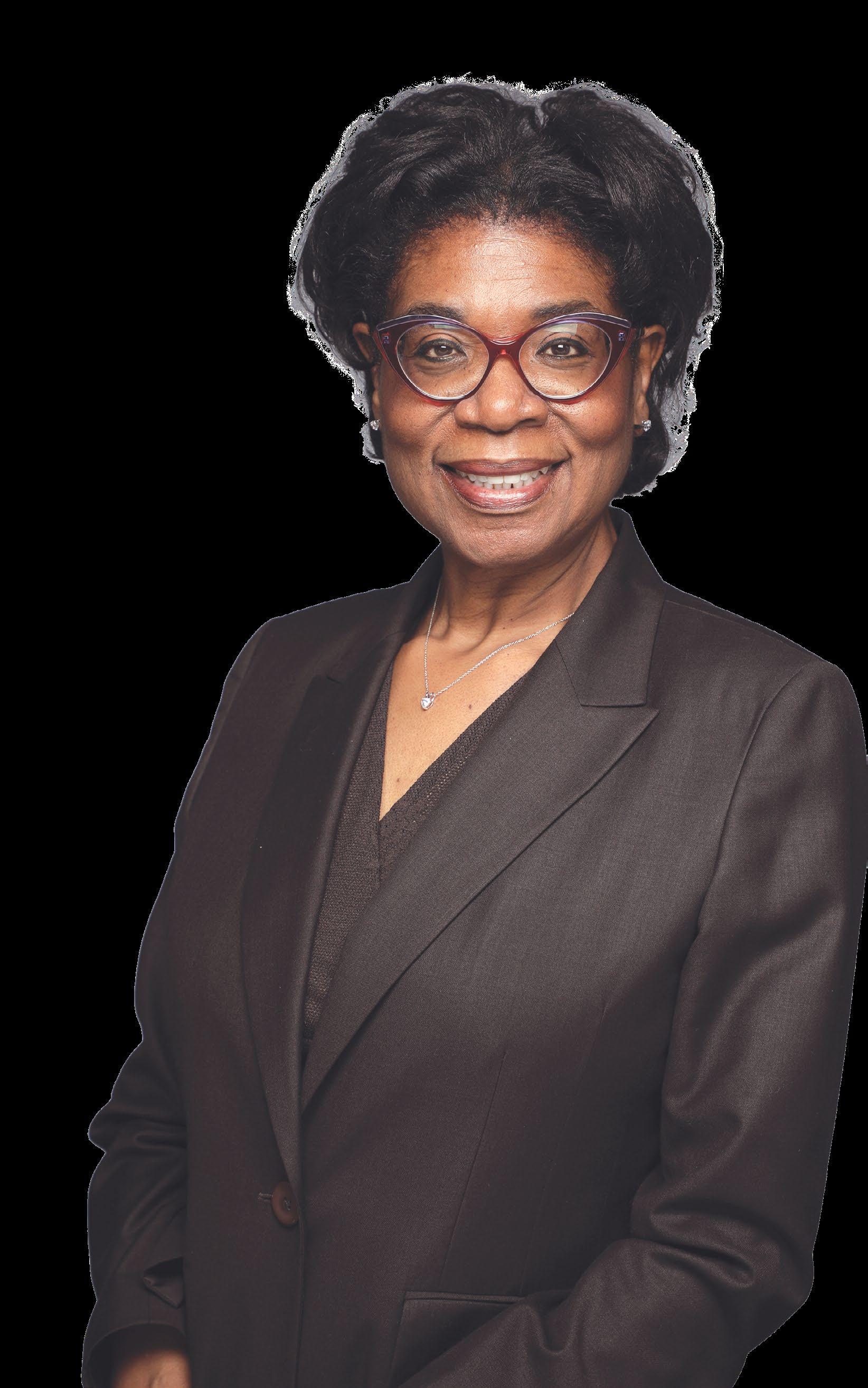

Lee first worked with Crawford back in 2009, when he was asked to co-teach a first-year PharmD course with her. He says Crawford acted as a mentor and changed the way he teaches.
“Stephanie taught me how to be engaging and fun and still be in control of the classroom.” He adds, “If a group of students was talking during lecture, she’d deal with it right away, saying ‘If I can hear you other students can hear you, so you’re affecting their ability to learn.’”
Crawford has won several teaching awards over the years, including four P1 Professor/Teacher of the Semester awards and two Outstanding P1 Teacher of the Year awards, which are voted on by students. Her outstanding teaching skills may come from her parents—her mother was a schoolteacher, and her father was a principal. In 2021, she established an endowed scholarship to honor them: the Benjamin and Esther Crawford Scholarship is awarded to P2, P3 and P4 students who demonstrate their commitment to the UIC community and/or patients in an academic, research, or employment setting.
Crawford’s enduring gift and professional contributions to UIC are surprising considering she arrived in 1992 with modest expectations. She was not used to Chicago’s winters and planned to leave after a year or two. “I am a Southerner,” she says proudly. Raised in North Carolina, Crawford earned her undergraduate pharmacy degree from the University of North Carolina at Chapel Hill, her master’s in institutional pharmacy programs from the
University of Maryland, and her PhD at the University of Texas at Austin. (Later, she earned an MPH degree from the UIC School of Public Health.) “I had lived in lots of places, but never anywhere so cold,” she says.
However, Crawford gradually recognized the potential at UIC. “My fellow faculty members were good people, and I knew I could accomplish a lot in this setting,” she says.
She was right. “The impact she's had on our students’ careers and learning is unparalleled,” says Glen Schumock, Dean of the Retzky College of Pharmacy. “On top of that, she’s a very important part of our university community.”
Schumock appointed Crawford as the inaugural executive associate dean for faculty affairs in the college in 2018.
“When I became dean, I knew I wanted Stephanie to be a part of the college’s leadership team,” says Schumock. “No matter what issue is being debated, she makes sure all the stakeholders get a seat at the table and their perspectives are considered.”
Over the years, Crawford has helped draft many of the college’s policies and guidelines related to faculty governance, awards, promotions, tenure, and pay. “She pushed for things like faculty salary analyses to make sure pay was fair and equitable,” says Schumock. “She’s really improved the infrastructure that we have to support faculty.”
I told them I plan to work until the last minute of my last day.
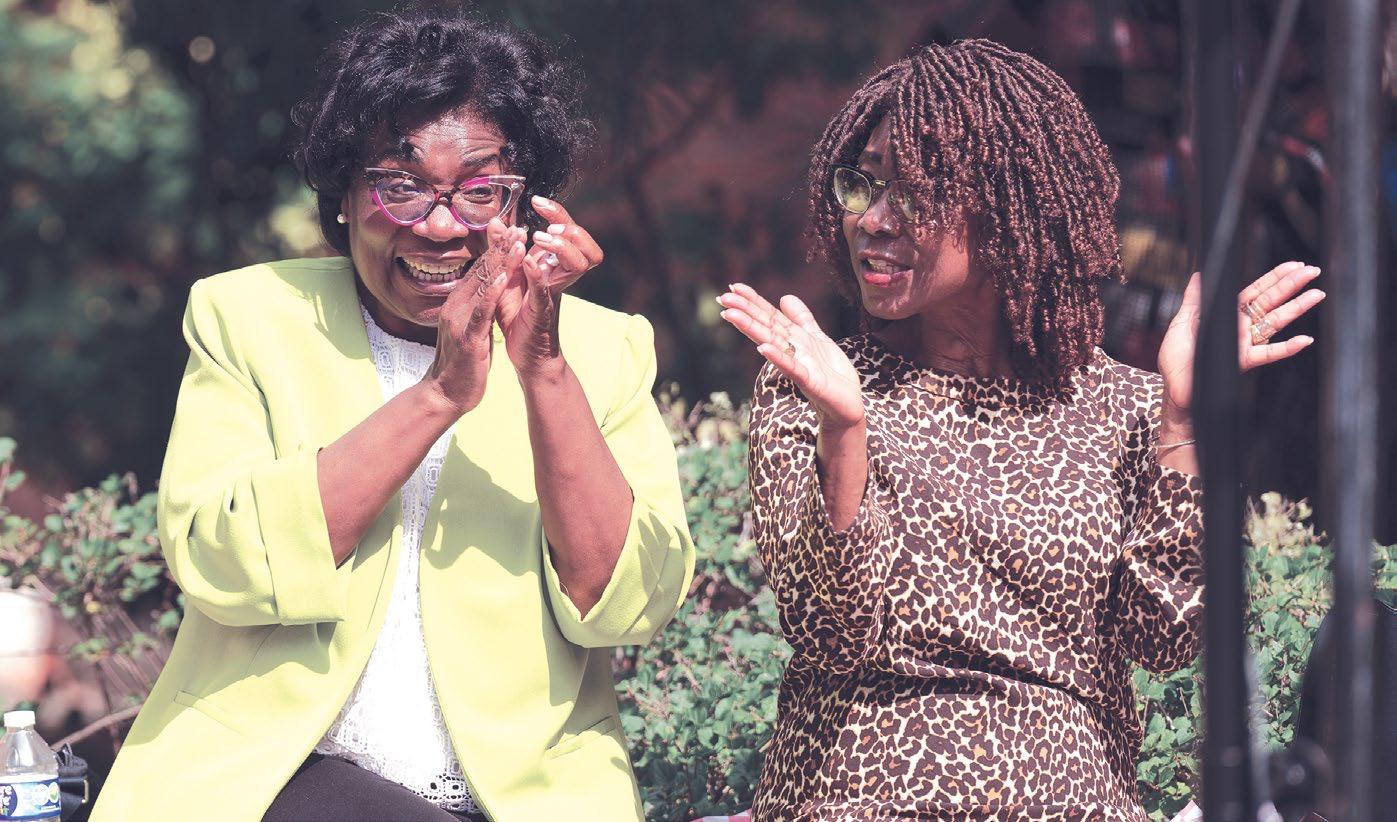
Crawford has also provided one-on-one support to many fellow faculty members. One of those faculty members is Dr. Clara Okorie-Awè, Clinical Professor of Pharmacy Systems, Outcomes and Policy, Associate Dean for Diversity, Equity, and Inclusion, and Director of the Urban Health Program and the Urban Pharmacy Concentration Program.
Okorie-Awè and Crawford met in the 90s. They were— and remain—two of very few black women in pharmacy academia. Okorie-Awè says Crawford championed her career and has become a close friend.
“After I earned my doctorates, she encouraged me to stay active in research. She told me, ‘You’ve got to keep publishing!’” Okorie-Awè listened, and the two women, along with other researchers, have coauthored several papers exploring faculty, staff and students’ cultural awareness and biases.
Much of Crawford’s other research also stems from a sense of justice, focusing on ensuring safe and effective medication use for all people, regardless of background or circumstances. “Some of the research I’m most proud of examines social determinants of health, such as race, education levels, geography, and income. We ask how those factors can affect healthcare access and how policy changes might make things better,” she says.
In addition to teaching and research, Crawford has influenced pharmacy and healthcare policies through her service. In 2023, she was selected by the multidisciplinary Drug Information Association as a fellow, an honorary title bestowed on fewer than 1% of DIA members for their active support in advancing global healthcare and life sciences. She is also a fellow of the American Pharmacists Association. And for more than 30 years, Crawford served as an expert volunteer on
the United States Pharmacopeia (USP) Nomenclature and Labeling Expert Committee, which through federal laws establishes drug products’ official titles (i.e., nonproprietary names and dosage forms) and certain labeling requirements to promote safe medication use.
This year, under Crawford’s leadership, the Nomenclature and Labeling Expert Committee won the prestigious United States Pharmacopeia Award for Outstanding Contributions to the Standards by a USP Expert Body.
“While the award goes to the entire committee, it is a reflection of Stephanie’s hard work and role as committee chair for the past 10 years,” says Misti Spann, Principal Scientist at USP and liaison to the Nomenclature and Labeling Expert Committee. “She’s driven by the desire to have the best possible outcome for all patients.”
Spann learned a lot watching Crawford lead committee meetings. She says, “Stephanie is able to see problems from different angles and foster productive discussions. She can say the uncomfortable thing without making people feel uncomfortable.”
That tactful candor will be missed at UIC. “She can’t be replaced,” says Dean Schumock.
After retirement, Crawford plans to return to North Carolina, where she still has family. Until then, she plans to keep fulfilling her faculty roles with the same strong work ethic she’s brought to UIC for the past 33 years: “I told them I plan to work until the last minute of my last day.”
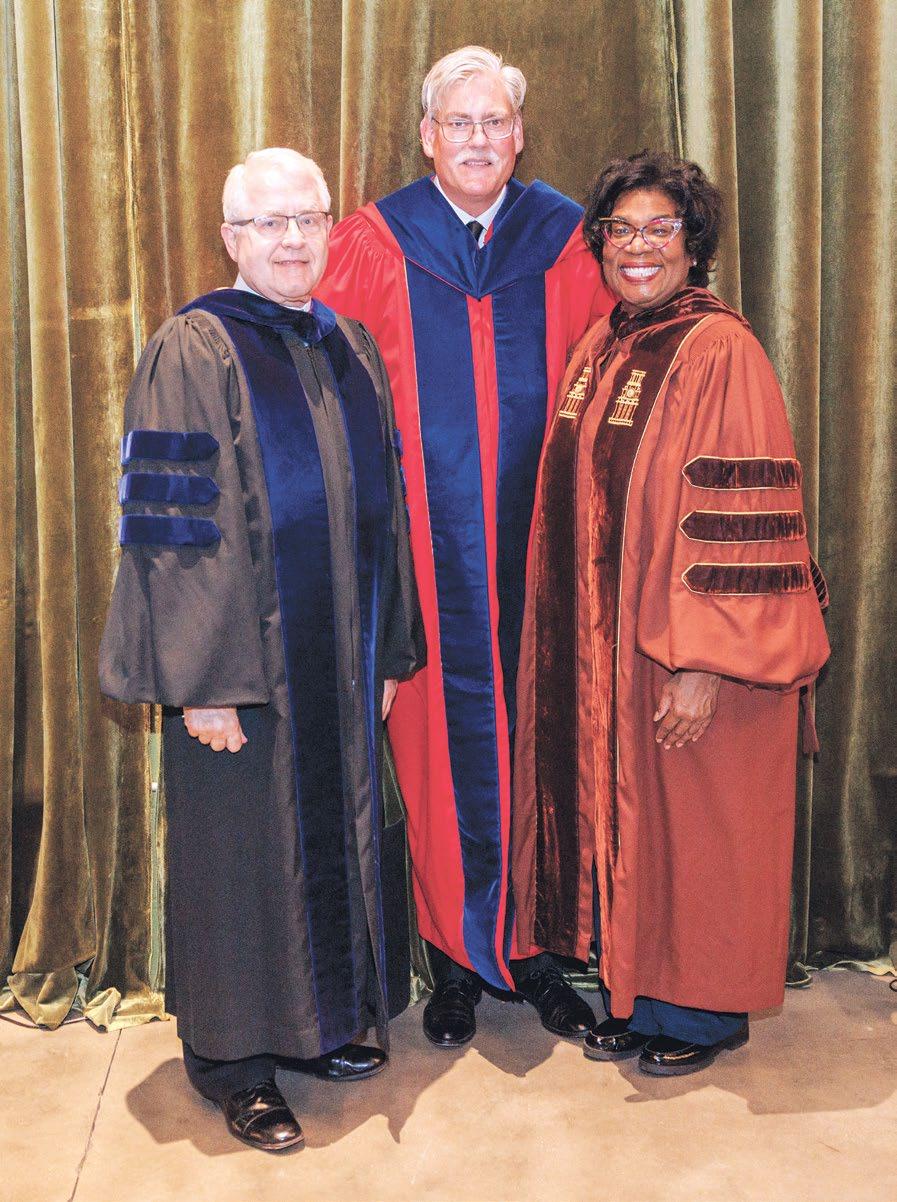
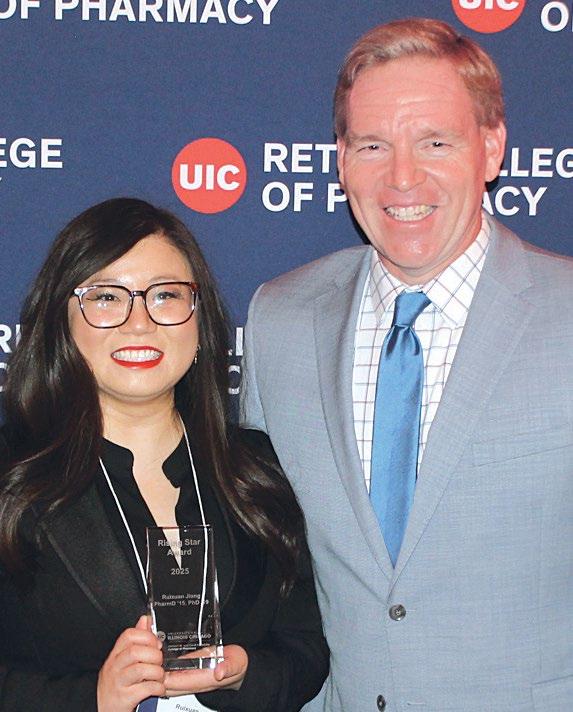
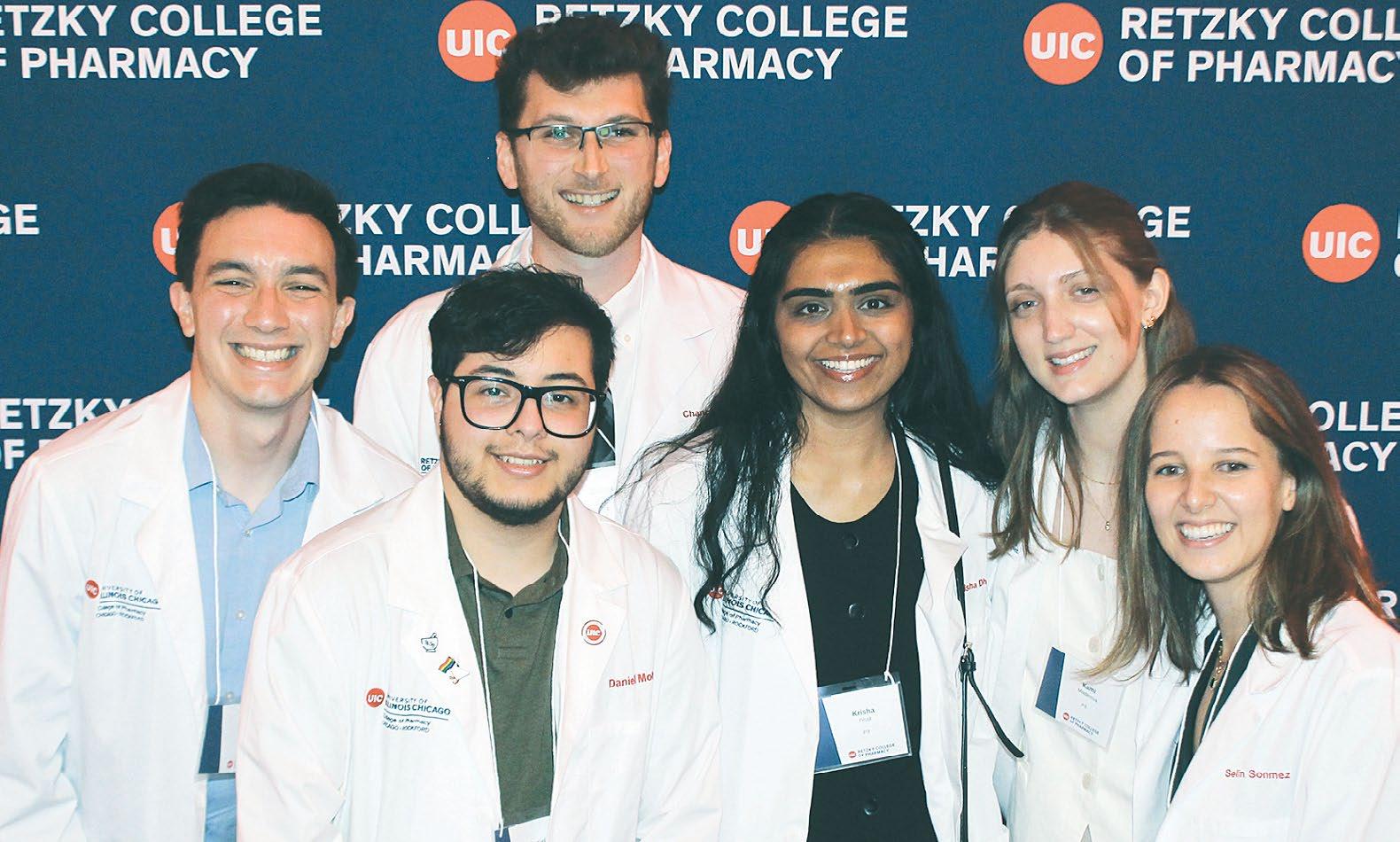
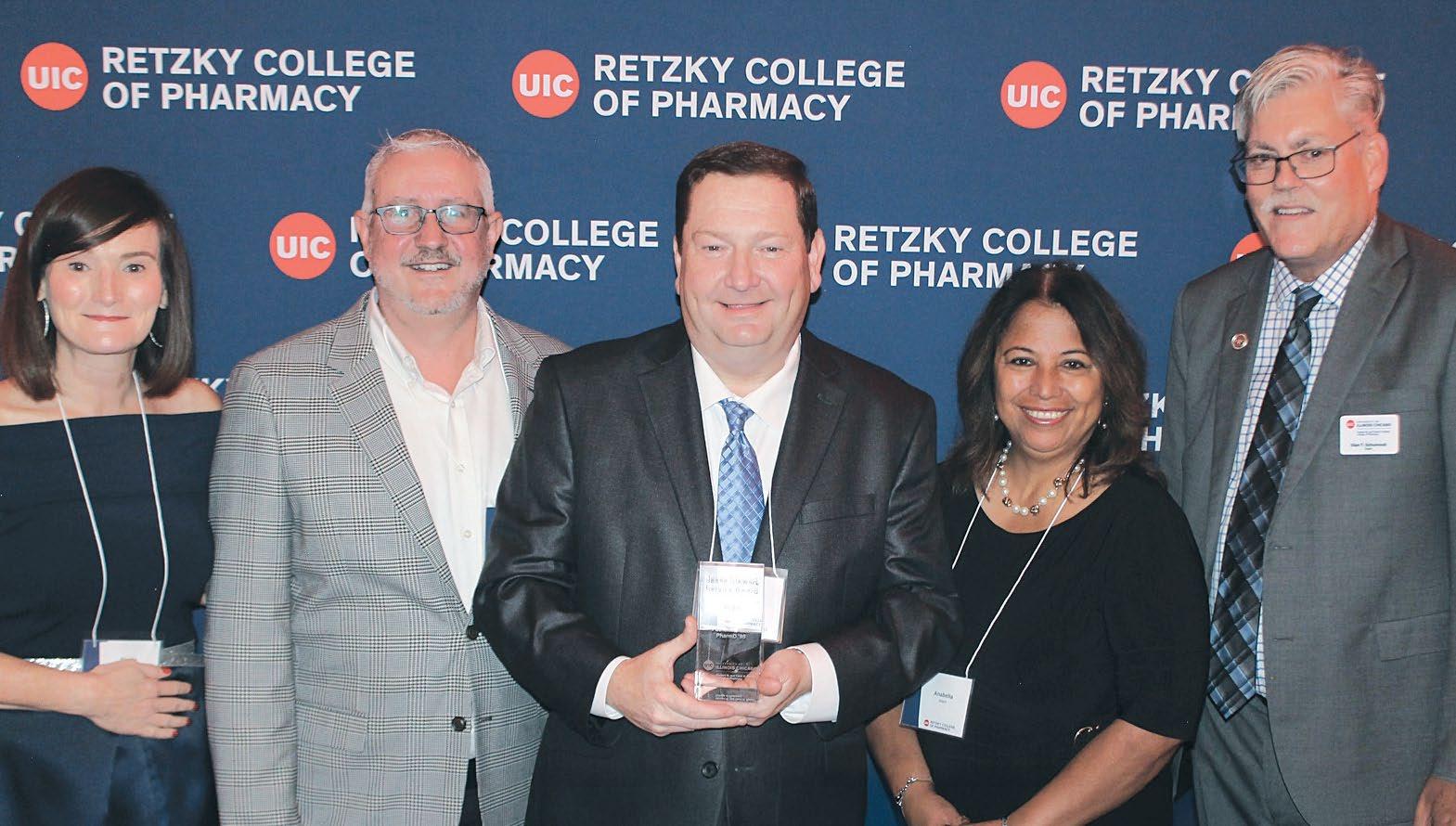
On Saturday, October 4, 2025, the UIC Retzky College of Pharmacy welcomed alumni for a day of connection, celebration, and recognition. The festivities began with an Open House at the Chicago campus, where guests explored updates to the college, reconnected with faculty, toured the hospital pharmacy, and mingled with fellow alumni from across the decades.
The evening concluded with a lively Alumni Reunion Dinner at the Drury Lane Theater. With over 100 attendees, the night featured a dinner as well as a special awards ceremony honoring outstanding alumni and donor achievements.
Thank you to everyone who joined us in making this reunion a memorable celebration of the UIC pharmacy community!

Congratulations to this year’s award recipients:
Rising Star Award
• Stephanie Dwyer Kaluzna, PharmD ’15
• Ruixuan Jiang, PharmD ’15, PhD ’19
Jesse Stewart Service Award
• Miriam A. Mobley Smith, PharmD ’95
• Patrick J. Allen, PharmD ’95
Legacy Achievement Award
• Beverly Vahlteich DeLaney
Alumni of the Year Award
• Rina D. Shah, PharmD ’05
What has changed in your life?
PLEASE LET US KNOW AT GO.UIC.EDU/ ALUMNIUPDATE
ELMA ABDULBAKI , PharmD ’25, was selected for the America’s Leader of Tomorrow Award by the DIA, Drug Information Association. The award will be given at the association’s 2025 Inspire Awards.
RICHARD DANIEL , PharmD ’20 was recently promoted to Associate Director of Scientific Communications at Vaniam Group.
MADDIE DIVITTORIO, PharmD ’23, completed her PGY2 in Infectious Diseases at Jesse Brown VA Medical Center and started a new position as a Clinical Pharmacist in Internal Medicine at UMass Memorial Medical Center.
KARIE GELYANA , PharmD ’15, has started a new position as Assistant Director of PADCEV HCP Promotion at Astellas Pharma.
KELLY MCGRAIL POKUT, PharmD ’91, started a new position as Chief Strategy Officer and Executive Vice President at Synergie Medication Collective.
GERDA MORDARSKI , PharmD ’24, started a new position as a Specialist in Poison Information at the Illinois Poison Center.
CHRIS OH , PharmD ’19, has started a new position as Associate Director, Field Medical Affairs at Regeneron.
SAM RIMAS , PharmD ’13, started a new position as Pharmacy Operations Manager at Rush University Medical Center.
HANNA SEO a new position as the Global Regulatory Strategy Manager at Regeneron.
GLEN SCHUMOCK , Dean of the UIC Retzky College of Pharmacy, welcomed his granddaughter, Willow Louise Schumock, on September 8, 2025.
SAMANTHA SOCCO , PharmD ’20, started a new position as Medical Science Liaison at Axsome Therapeutics, INC.
MARGARET H. TOMECKI , PharmD ’96, has transitioned into a new role at the American Pharmacists Association as Senior Director for Leadership Development, Research, and Science Initiatives.
YOOJUNG YANG , PharmD, MS ’10, started a new position as the Head of Health Economics and Outcomes Research (HEOR) at Lantheus.

ROGER L. BERMAN , Class of 1968, passed on February 7, 2024. Berman was 83 years of age and a resident of Evanston, Illinois.
RICHARD J. BERNES , Class of 1969, passed away on July 5, 2024. Richard was 78 years old and a resident of San Jose, California.
JOHN C. BLAUFUSS , Class of 1964, passed on September 12, 2025. Blaufuss was 91 years of age and a resident of Danville, Illinois.
JOSEPH L. BORSKI , Class of 1963, passed on January 8, 2024. Borski was 87 years of age and a resident of Tinley Park, Illinois.
BARRY M. CHAPNICK , Class of 1965, passed on March 6, 2024. Chapnick was 83 years of age and a resident of Chicago, Illinois.
TERESE M. CRISTANUS , Class of 1985, passed on April 8, 2024. Cristanus was 64 years of age and a resident of Springfield, Illinois.
RITA J. FABIJONAS , Class of 1981, passed on December 14, 2024. Fabijonas was 93 years of age and a resident of Wheeling, Illinois.
NINA R. FOUSHI , Class of 1958, passed on May 15, 2025. Foushi was 90 years of age and a resident of Phoenix, Arizona.
HAROLD ISENBERG , Class of 1963, passed on February 23, 2024. Isenburg was 86 years of age and a resident of Encinitas, California.
JOSEPH R. KONZIER , Class of 1962, passed away on May 19, 2025. Joseph was 85 years old and a resident of Grand Junction, Colorado.
MARTIN E. LASAK , Class of 1977, passed on January 30, 2025. Lasak was 71 years of age and a resident of Carol Stream, Illinois.
JOSEPH P. LEVATO , Class of 1963, passed on March 18, 2024. Levato was 84 years of age and a resident of Chicago Ridge, Illinois.
ROBERT L. LODESTRO , Class of 1962, passed on December 6, 2024. LoDestro was 90 years of age and a resident of Antioch, Illinois.
GRAZYNA C. NIEMCZURA , Class of 1964, passed on May 11, 2024. Niemczura was 84 years of age and a resident of Grayslake, Illinois.
JOHN P. PINDERSKI , Class of 1960, passed on May 14, 2025. Pinderski was 87 years of age and a resident of San Diego, California.
SALVATORE C. RINELLA , Class of 1961, passed on March 14, 2025. Rinella was 88 years of age and a resident of Missouri Valley, Iowa.
ROBERT S. SALDANA , Class of 1994, passed on April 25, 2024. Saldana was 79 years of age and a resident of Helotes, Texas.
RICHARD A. SCHRANZ , Class of 1950, passed on July 30, 2024. Schranz was 97 years of age and a resident of Sarasota, Florida.
MELISSA D. SIEGMUND, Class of 1995, passed on May 2, 2025. Siegmund was 54 years of age and a resident of Saint Joseph, Illinois.
WAYNE A. SOBOTA , Class of 1971, passed on January 7, 2025. Sobota was 78 years of age and a resident of Frankfort, Illinois.

ROBERT VRANY, Class of 1955, passed on April 18, 2025. Vrany was 92 years of age and a resident of Phoenix, Arizona.

PATRICIA A. WEINSWIG , Class of 1959, passed on May 12, 2024. Weinswig was 87 years of age and a resident of Madison, Wisconsin.
RICHARD C. WERNER , Class of 1963, passed on April 13, 2025. Werner was 84 years of age and a resident of New Brighton, Minnesota.
MARVIN N. ZISSMAN , Class of 1957, passed on January 24, 2025. Zissman was 90 years of age and a resident of Algonquin, Illinois.
